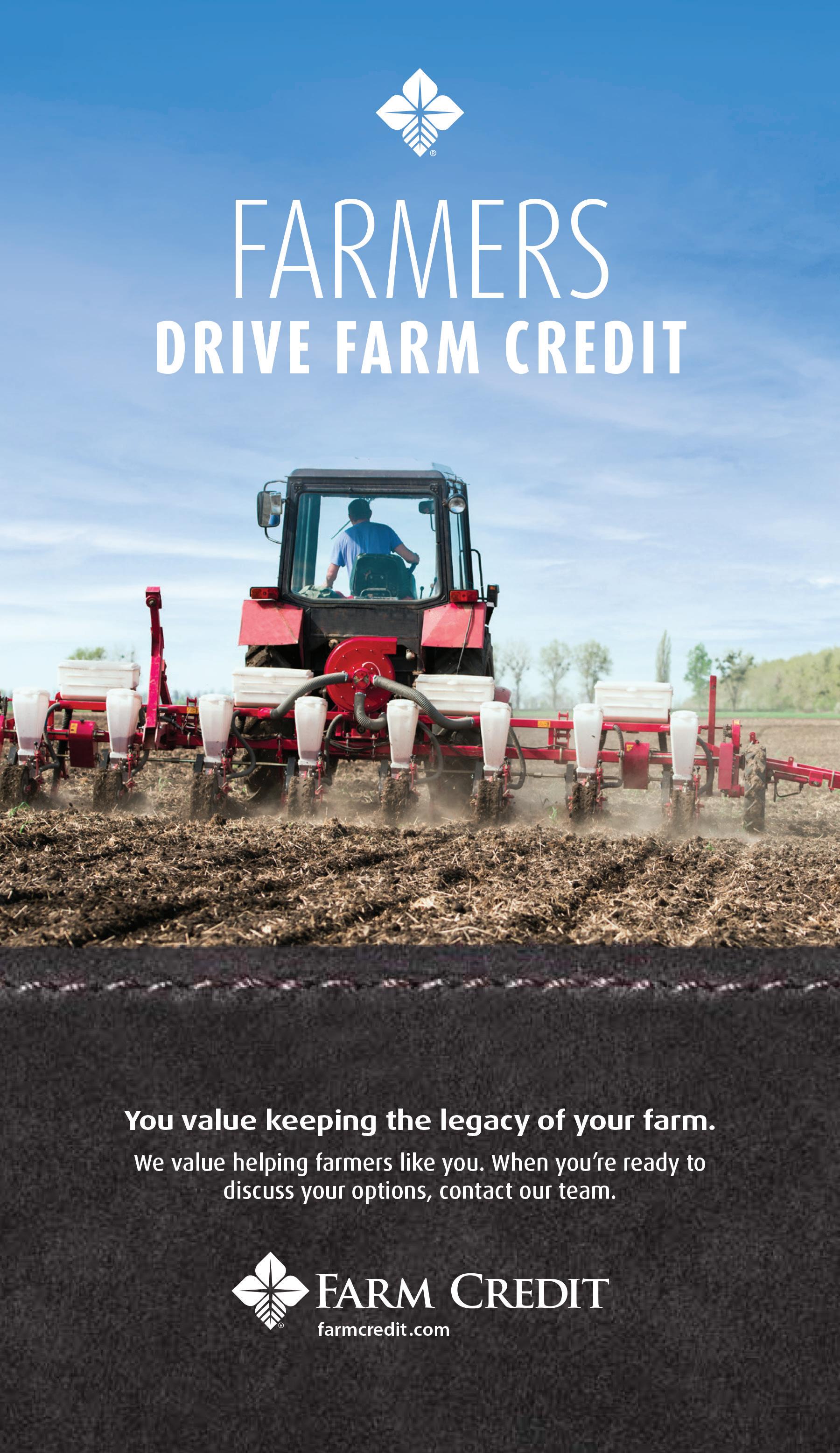




5 FRONTIER SPIRIT EMBRACED AT NATIONAL CONVENTION
Virginia farmers joined thousands from across the nation to collaborate on policy at the American Farm Bureau Annual Convention in Salt Lake City.
14 YOUNG FARMERS EXPLORE THE FRINGES OF FARMING
Almost 200 young farmers visited the Virginia Capitol, toured niche farms and learned about keeping family operations going.
18 BEEF FARMERS ENSURE QUALITY PRODUCT THROUGH CERTIFICATION
Virginia Beef Quality Assurance program gives farmers the ability to expand production knowledge, increase consumer confidence and strengthen farm profitability.
“Getting certified can only positively impact your operation.”
— LISA MCCORMICK, Virginia Beef Center of Excellence coordinator at Virginia Tech LAUREN
Producer members will receive their next issue of Virginia Farm Bureau News in September. The magazine is published quarterly, and back issues can be viewed at issuu.com/ virginiafarmbureau
Volume 83, Number 2
April 2024
4
Farm Bureau News
Virginia Farm Bureau News (USPS 017-763) (ISSN 1525-528X) is published four times a year. January, April, September, November. It is published by Virginia Farm Bureau Federation, 12580 West Creek Parkway, Richmond, VA 23238. Periodicals postage rate is paid at Richmond, VA and additional mailing offices. The annual Subscription Rate is $1.13 (included in membership dues).
Postmaster: Please send changes of address to, Virginia Farm Bureau Federation, Farm Bureau News, P.O. Box 27552, Richmond, VA 23261-7552; fax 804-290-1096. Editorial and business offices are located at 12580 West Creek Parkway, Richmond, VA 23238. Telephone 804-290-1000, fax 804-290-1096. Email virginiafarmbureaunews@vafb.com. Office hours are 8 a.m. to 4:30 p.m., Monday through Friday.
Members — Address change? If your address or phone number has changed, or is about to change, contact your county Farm Bureau. They will update your membership and subscription information. All advertising is accepted subject to the publisher’s approval. Advertisers must assume liability for the content of their advertising. The publisher assumes no liability for products or services advertised. The publisher maintains the right to cancel advertising for nonpayment or reader complaints about services or products.
Member: Virginia Press Association
EDITORIAL TEAM
Pam Wiley Vice President, Communications
Kathy Dixon Managing Editor
Nicole Zema Sr. Staff Writer/Photographer
Christina Amano Dolan Staff Writer/ Photographer
Eleanor Stickley Graphic Designer
Maria La Lima Graphic Designer
Alice Kemp Sr. Staff Writer/Advertising Coordinator
VIRGINIA FARM BUREAU FEDERATION
Officers
Wayne F. Pryor, President
Scott E. Sink, Vice President
Board of Directors
DIRECTOR DISTRICT COUNTY
Emily F. Edmondson 1 Tazewell
Richard L. Sutherland 2 Grayson
Bruce N. Stanger 3 Montgomery
Jeannie L. Dudding 4 Craig
Russell L. Williams II 5 Rockbridge
Justin Pence 6 Shenandoah
Thomas E. Graves 7 Orange
Leigh H. Pemberton 8 Hanover
William F. Osl Jr. 9 Cumberland
Robert J. Mills Jr. 10 Pittsylvania
J. M. Jenkins Jr. 11 Lunenburg
J. Barry Bates 12 Essex
Gary D. Cross 13 Southampton
Virginia cattle certified through the Beef Quality Assurance program benefit both farmers and consumers (Photo by Briana Ingram)
David L. Hickman 14 Accomack
A. Faye Hundley * Essex
Michelle Fox ** Tazewell
*Women’s Committee Chairman
**Young Farmers Committee Chairman WE’RE
85%
The amount of U.S. beef that comes from Beef Quality Assurance-certified farmers. See related article on page 18.
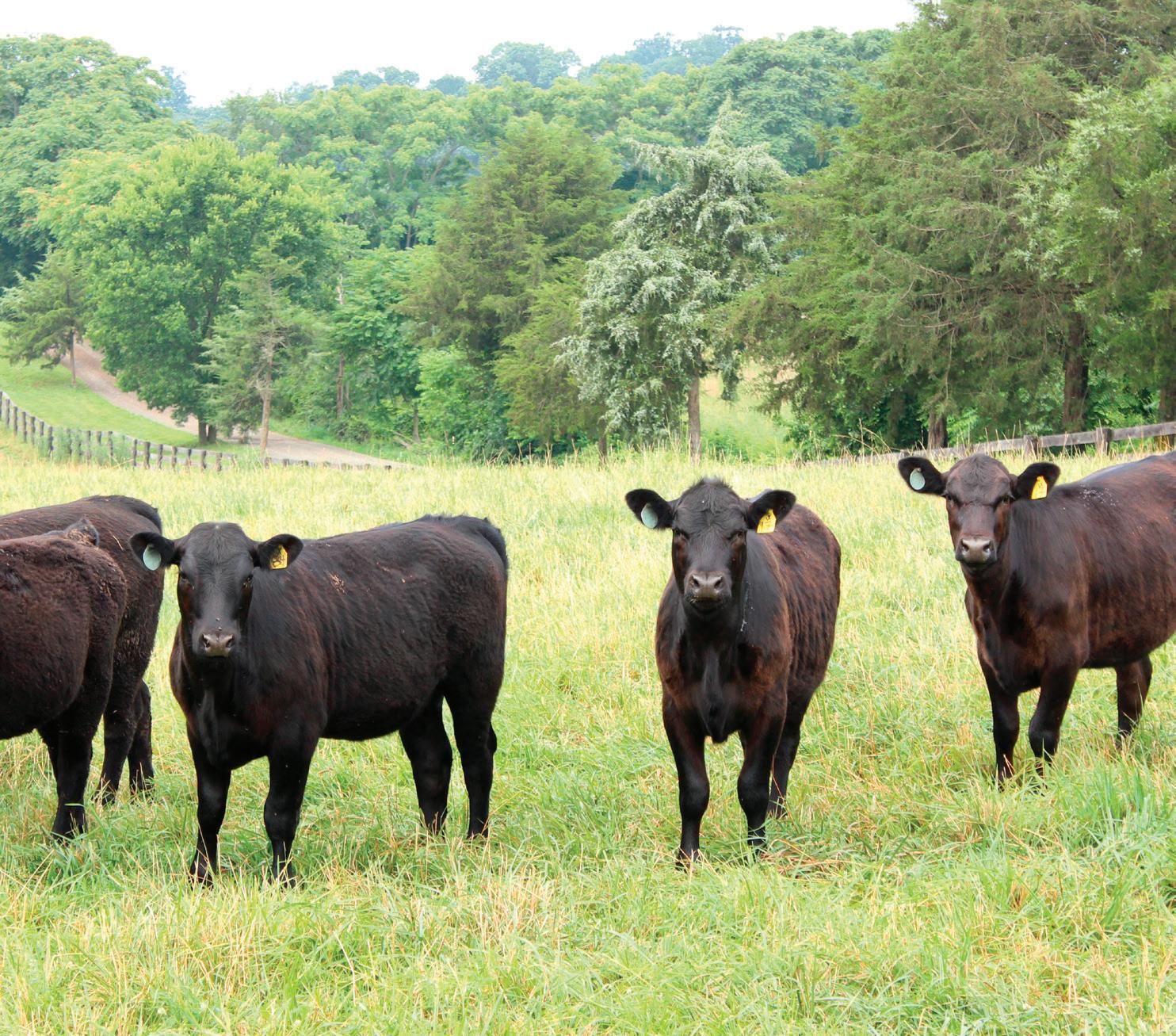
WATCH US!
Featured this month on Real Virginia, Virginia Farm Bureau’s weekly television program:
• Learn why a Carroll County middle school FFA chapter won a national award.
• Discover what farmers have to do to get ready for spring planting season.
• Find out how the Agriculture in the Classroom Teacher of the Year is incorporating agriculture into her lesson plans.
Real Virginia airs nationwide at 3:30 p.m. on the first Saturday of each month on RFD-TV on Dish Network and DirecTV, and on selected cable outlets around the state. It airs weekly on WBRA digital channel 15.2, the WHRO World Channel, WVVA Bluefield and WTKR Norfolk, and on the first and third weekends of each month on WVIR Charlottesville, WHSV Harrisonburg, WRLH Richmond and WSLS Roanoke.
Sponsors and teams of four are invited to participate in the annual Virginia Foundation for Agriculture in the Classroom Charity Golf Tournament in May. The tournament will offer two shotgun starts with awards following each round of play. Light food and refreshments will be available throughout the day.
when: May 13
where: The Dominion Club in Henrico County registration: Visit virginia.agclassroom.org for more information and to register.
As of April 1, there are exactly 179 days until the 2024 State Fair of Virginia opens on Sept. 27
Fair fact:
In addition to breaking an attendance record by reaching capacity for the first time, the 2023 fair also hosted more than 4,000 exhibitors and drew over 8,000 entries in competitions for livestock, vocational and technical education, visual and culinary arts, horticulture and more.
If you’d like to earn blue ribbon bragging rights in the fair’s competitions this fall, now is the perfect time to brainstorm and practice what you’d like to bake, cook, craft, grow or raise! The fair’s 2024 competition guidelines will be available this summer at StateFairVa.org
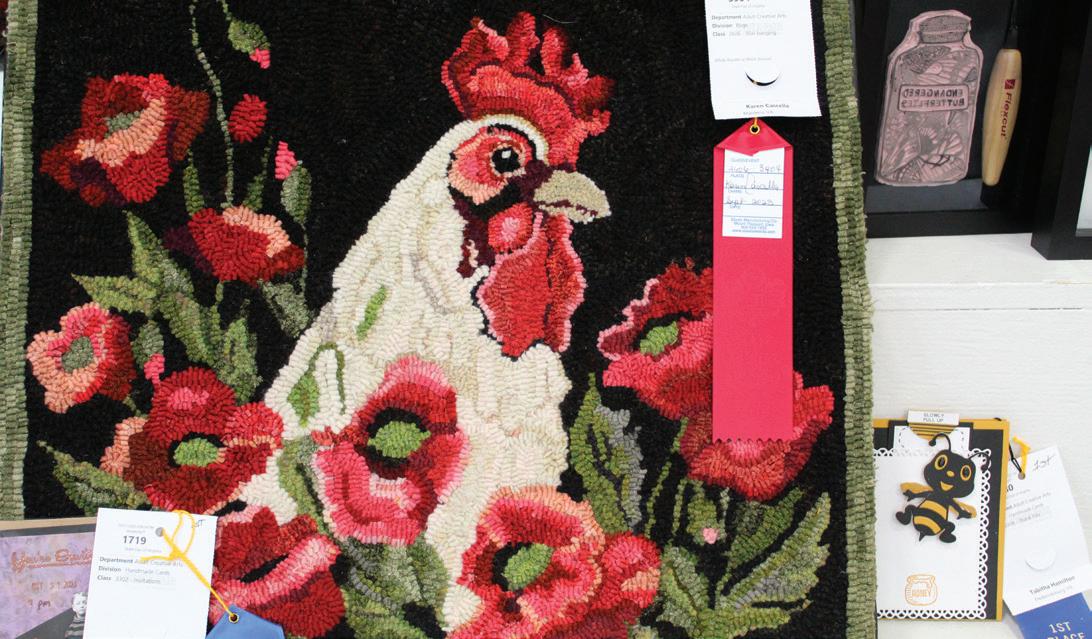
The 2024 Virginia Farm Bureau® Federation Annual Convention will be held Dec. 2-5 at the newly renovated Omni Homestead Resort in Hot Springs. Plans for the annual event include guest speakers, policy discussion, competitive events, award recognitions and informative programming. Registration is expected to open by Labor Day. The convention is open to county Farm Bureau members, staff and any member of the public interested in learning more about Virginia agriculture.
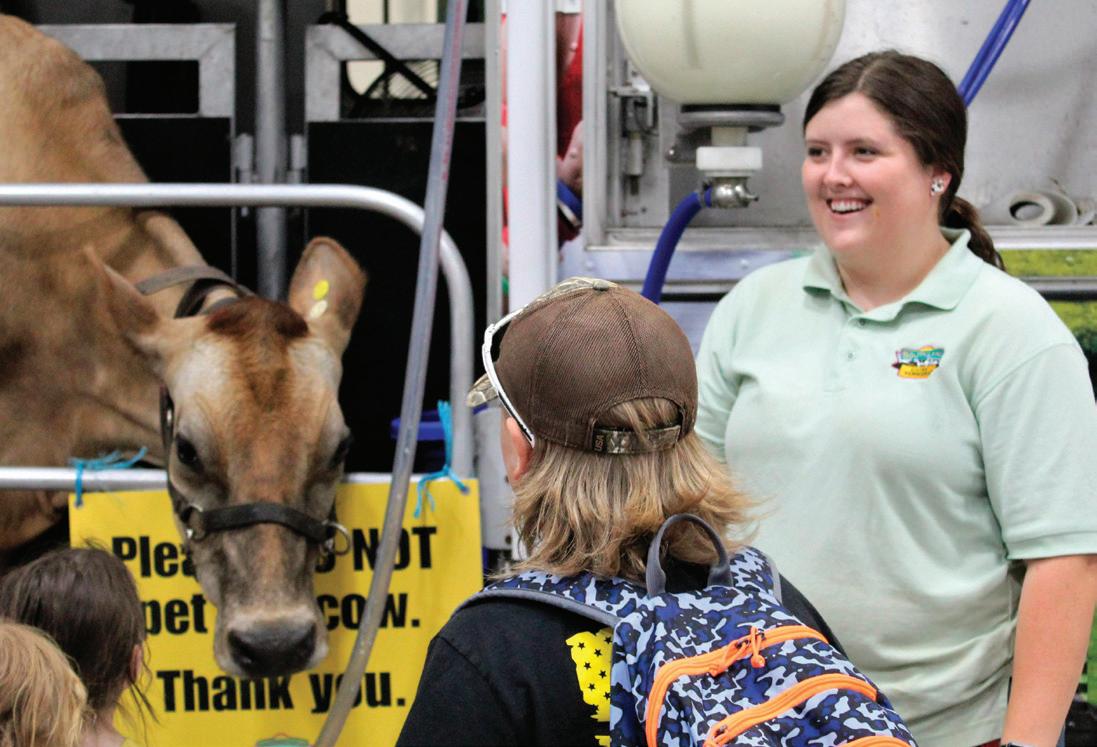
The Meadow Event Park in Caroline County has transitioned the Virginia Farm Festival to Ag Days at The Meadow, which will be held May 2-3 at the venue’s First Bank & Trust Pavilion. The new event will feature abundant learning opportunities for students and adults alike.
Last year’s festival introduced morning programming for school field trips, drawing over 500 students who learned about Virginia agriculture and the state’s natural resources.
Feedback from educators and educational partners unearthed a need in surrounding communities for more fun, hands-on learning activities about agriculture, according to Sarah Jane Thomsen, manager of agriculture education and strategic partnerships programming for The Meadow.
“We’re really trying to lean into that and offer intentional programming and educational opportunities for students to get their hands a little dirty, get their minds thinking, and just learn more about where their food comes from,” she explained.
The event will feature four time slots for school field trips. Morning time slots are open exclusively to public and private school groups to accommodate their set schedules. Thursday afternoon will be open for home school and youth groups, and Friday afternoon will be open for adult day support programs and other groups.
Activities for students will include quick structured lessons, animals in Young MacDonald’s Farm, cow milking demonstrations by SouthLand Dairy Farmers, and interactive displays from Virginia Farm Bureau Federation, Agriculture in the Classroom and Virginia State University’s mobile classroom.
The event also will feature Ag Superhero Trading Cards with a paired activity for educators. The cards were created last year as part of the State Fair of Virginia Ed Expo. They feature Virginia “superheroes” in agriculture and natural resources who were nominated by the public. Lesson plans are available on the State Fair website, and schools can submit card requests for their classrooms.
Details are available at StateFairVa.org/p/about/agday.


Commonwealth farmers embraced the pioneer spirit in January as they ventured west to the 105th annual American Farm Bureau Federation Convention in Salt Lake City. Joining 4,500 farmers from across the nation, Virginia’s agricultural leaders voted on policy, attended workshops and cheered on VFBF Young Farmers competitors.
“You can truly feel that frontier spirit out here in the West,” said AFBF president Zippy Duvall. “I’m sure pioneers had doubts and fears along the way, but they worked together, persevered, and they made it. I believe farmers have a little bit of the pioneer spirit in us too. We’re eager to see what’s next and how to get there together.”
Goochland County young farmers
Thomas and Rachel Henley took third place in the AFBF Excellence in Agriculture Award competition. In a live presentation, they showcased their backgrounds, contributions, barriers and victories in agriculture.
Dr. Amanda Weakley-Scott, a livestock veterinarian and farmer from Madison County, advanced to the semifinal round of the national
Discussion Meet. During the collaborative four-person discussions, she talked about engaging diverse agricultural sectors and leaders, and the advancement of industry-wide sustainability, while building consensus and exploring solutions.
Adam Davis, a Halifax County farmer and VFBF Achievement Award recipient, competed on the national level at the convention.
Also representing Virginia was Brunswick County Young Farmer Matt Fimon, who wrapped up his oneyear term as chair of the AFBF Young Farmers and Ranchers Committee.
“I’ve gotten to see and experience agriculture in different parts of the country,” he recapped. “I went to the Capitol to speak with representatives on policy, strengthened our international relationship with Japanese young agriculturalists, and experienced the fellowship of the AFBF board.”
Virginia Farm Bureau Women’s Leadership Committee members attended their annual meeting, participating in a regional caucus, panel
discussions, networking functions and training sessions.
Duvall said farm life calls on women to do hard things, “and you do it better than we do. We ask a lot of you. But what you do in your own community is probably the most important.”
Faye Hundley, chair of the Virginia WLC, said several members had never attended an AFBF convention before.
“I encourage ladies, especially new members, to make it a point to become a voting delegate,” she said. “I feel like it takes you to another level of leadership. Attending AFBF is a good reminder that we’re a family, and this is our community.”
Committee members who offered input on policy also included Margaret Arbogast of Rockingham County; Katelyn Burner of Orange County; Susan Combs of Smyth County; Sarah Large of Buckingham County; Candace Monaghan of Botetourt County; Carolyn Neal of Tazewell County; and Jamie Pence of Shenandoah County. Keighley Gore of Frederick County, 2023 Distinguished Farm Bureau Woman, also attended.
VFBF President Wayne F. Pryor is one of 11 state Farm Bureau presidents re-elected to two-year terms representing the region on the AFBF board of directors. He led a group of eight voting delegates from Virginia.
“Including the distinct perspectives of Virginia’s farmers is valuable to AFBF’s national policy development process,” he said.
They voted on policies to:
• Address the growth of artificial intelligence in agriculture, while protecting privacy rights.
• Stabilize wage rates for guest workers and revise H-2A and H-2B programs.
• Reaffirm support for increasing reference prices in the farm bill and maintaining a strong crop insurance program, including an expansion
of eligibility to ensure more commodities are covered.
• Support additional funding to improve data collection on the foreign ownership of agricultural land.
• Change to the contract poultry pay system to ensure long-term economic sustainability for farmers, and to require more transparency from poultry processing companies.
• Recommend Congress investigate fertilizer supply chain outages and tariffs placed on imports.
Delegates from Virginia included VFBF Vice President Scott Sink; Bobby Combs of Smyth County; Roger Elkins of Lee County; Chuck French of Shenandoah County; Kory Gough of Prince William County; Ceceila Moyer of Ameila County and Mack Smith of Rockbridge County.
U.S. Secretary of Agriculture Tom Vilsack addressed the convention’s closing general session.
“I think it’s important for us to recognize as a country the incredible contribution that is made by farmers and ranchers and producers that, indeed, makes our country the strongest and most powerful in the world,” he said.
Vilsack announced more than $200 million in loans and grants for fertilizer production and renewable energy.
New mental health resource unveiled
Farming is tough on the best of days, Duvall said.
“And it can really be lonely out there sometimes, especially with the pressures that we face,” he continued.
Duvall announced AFBF has established a new relationship with the Farm Family Wellness Alliance to launch access to a peer-to-peer support community, Togetherall, which is free to all American farm families 24/7.
Togetherall is a safe, anonymous online community continuously
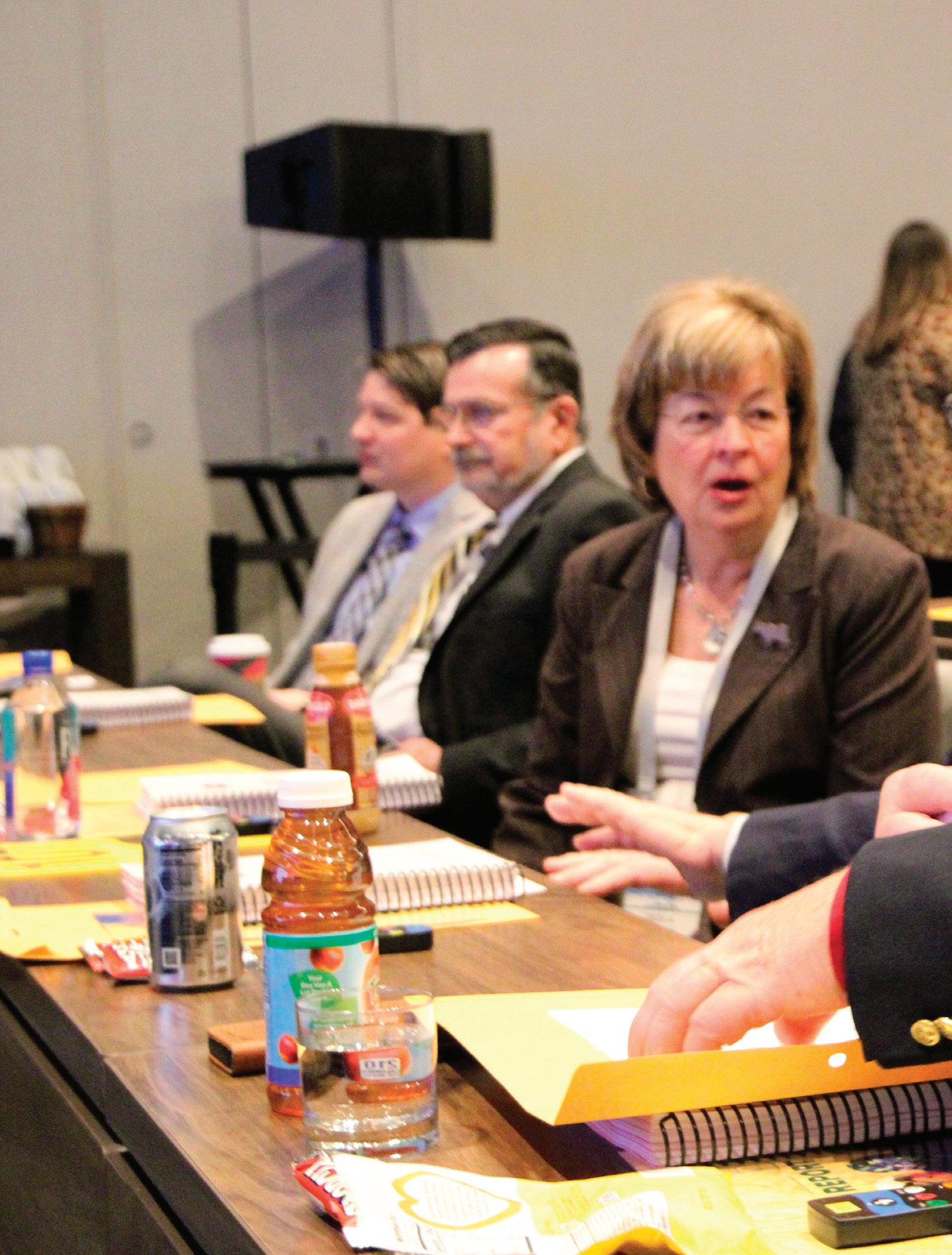
moderated by licensed physicians. Farmers and family members aged 16 or older can create a profile with an anonymous username and access a global network of peers who will listen and support them. In addition to the global community, Togetherall offers access to agricultural sector subgroups in which farmers can share their experiences with like-minded people.
Visit Togetherall.com to learn more.



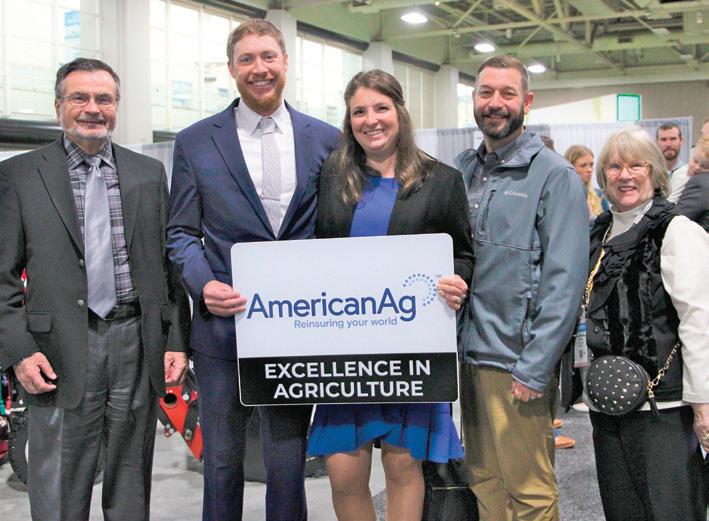
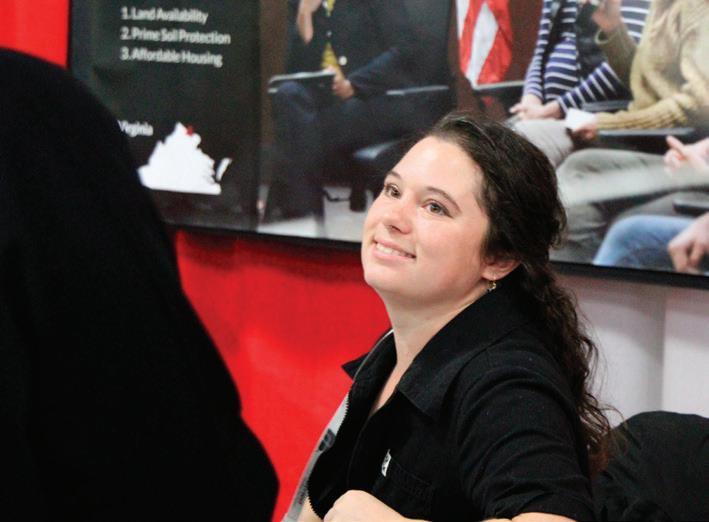
A crop markets workshop reminded attendees that the global connectedness of agricultural trade means international disruptions eventually affect farmers, and the U.S. economy in general.
Terrorist acts against shipping vessels in the Red Sea and low water levels in the Panama Canal are two major obstacles hindering the movement of U.S. agricultural exports. These result in increased shipping costs and delays, influencing market prices and ultimately hurting the farmer’s bottom line.
At a livestock markets workshop, farmers learned that demand and prices for poultry products are strong, but ongoing contraction in cattle markets, all-around high input prices and interest rates, plus economic inflation, present obstacles.
Virginia received AFBF Awards of Excellence in all four program areas: advocacy, coalitions and partnerships, engagement and outreach, and leadership and business development.
Loudoun County Farm Bureau was among 24 county Farm Bureaus to receive an AFBF County Activities of Excellence Award. The competition celebrates unique, volunteer-driven programming at the local level.
They were recognized for ongoing efforts to increase the engagement and visibility of the young farming population in the county. Their Young Farmers Committee hosted a panel discussion with the Loudoun County Board of Supervisors chair, drawing around 75 community members. The committee hopes to garner the county’s support of a purchase of development rights program to protect valuable farmland, as well as programs to assist young farmers with starting and growing their businesses.
• Save up to 30% off Avis base rates with Virginia Farm Bureau’s Avis Worldwide Discount number. In addition, enjoy more offers like dollars off, a complimentary upgrade or a free weekend day. Call 800-331-1212 or visit avis.com/ vafb to make a reservation.
• Save up to 35% off Budget base rates with Virginia Farm Bureau’s Budget Customer Discount number. Plus get other great offers like dollars off, a free upgrade or a free weekend day. Call 800-527-0700 or visit budget.com/vafb to make a reservation.
• Your Virginia Farm Bureau Avis Worldwide Discount number and Budget Customer Discount number are available from your county Farm Bureau and in the “Membership at Work” section of vafb.com (Register as a member on the site, and log in first).
Your Farm Bureau membership gives you access to significant savings at thousands of hotel properties. Reservations are required, and blackout dates may apply.
Whether you’re looking for an upscale hotel, an all-inclusive resort or something in between, Wyndham Hotels & Resorts has the right hotel for you! As a Virginia Farm Bureau member, you will save up to 20% off the “best available rate” at over 8,000 participating hotels worldwide.
To take advantage of this discount rate, call 877-670-7088 or visit wyndhamhotels.com/farm-bureau. Use the Virginia Farm Bureau identification number, available at vafb.com/ benefits and from your county Farm Bureau, when making a reservation. Present your membership card when you check in.
Biltmore Estate in Asheville, North Carolina, is America’s largest home. Built by George and Edith Vanderbilt, this 8,000-acre property offers beautiful gardens, biking, carriage rides, horseback riding, kayaking, paddle boarding and more. Farm Bureau members in Virginia will receive up to $8 off online admission to the historic Biltmore estate.
While there, browse through unique estate shops for wine lovers, gardeners, bookworms and everyone in between. Savor complimentary tastings of more than 20 handcrafted
wines; view rare treasures from the Biltmore collection; and learn about the estate’s barnyard animals. Visit Biltmore.com/corporateperk for more information. Tickets must be purchased in advance.
Located in Pigeon Forge, Tennessee, Dollywood is recognized as one of the world’s best theme parks. Spanning 150 acres and located near Great Smoky Mountains National Park, Dollywood offers more than 40 rides and attractions, including Lightning Rod, the world’s fastest wooden coaster. Dollywood has won more awards than any other theme park for its live shows featuring country, bluegrass, Southern gospel and classic rock. Master craftsmen demonstrate the area’s rich artistry, from hand-blown glass to blacksmithing. Members may purchase discount tickets to the Dollywood Theme Park by visiting vafb.com/benefits or Dollywood.com
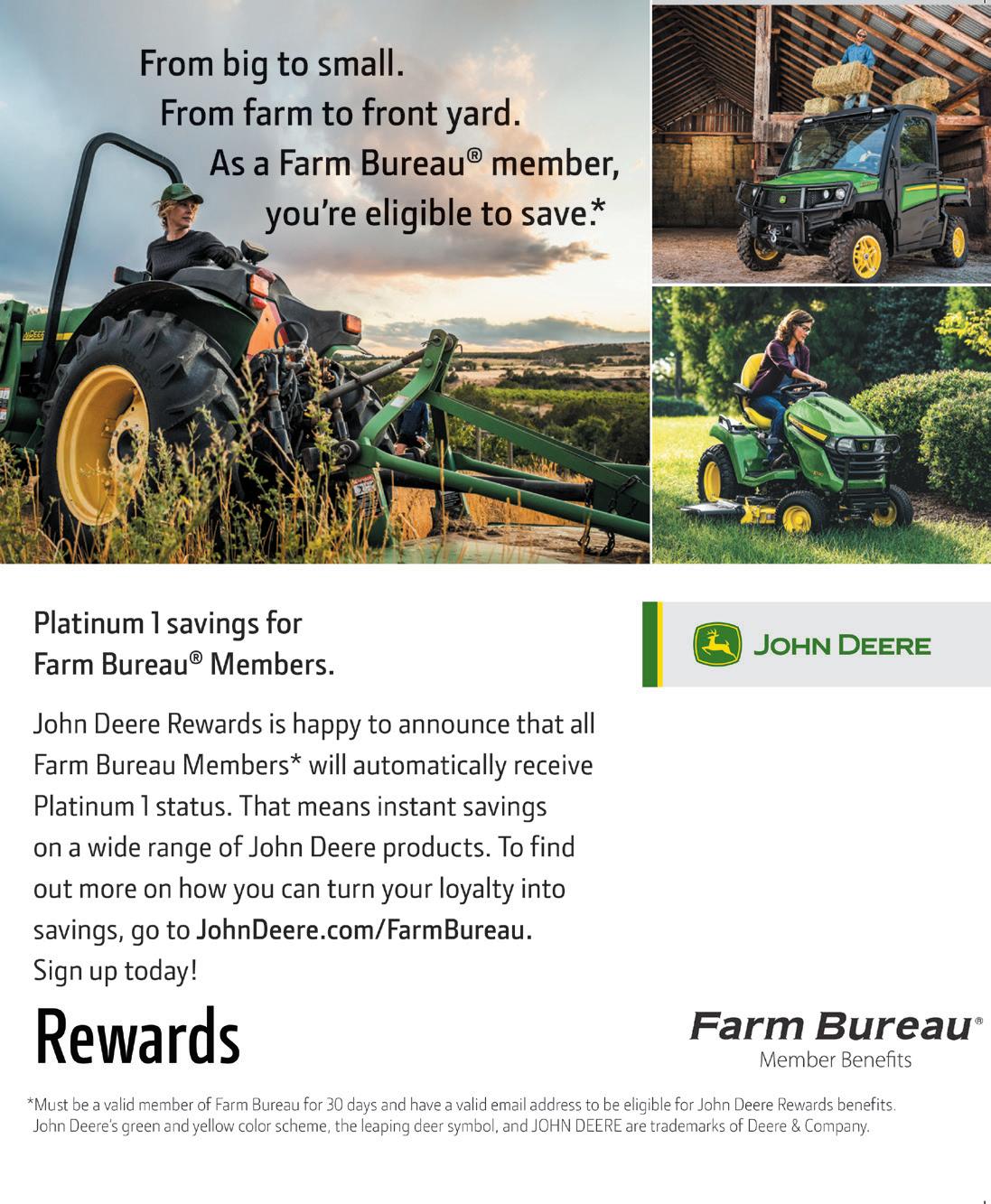
Several Virginia Farm Bureau Federation employees who support producer members through business development and lobbying have been promoted, and others have been hired to better serve members.
In the Agriculture, Development & Innovation Department:
Jacob Ver Beek was hired as a VA FAIRS specialist. Ver Beek was an intern last summer and graduated this past December from Virginia Tech with a degree in agribusiness. He will work directly with VA FAIRS clients, assisting them with business planning needs. He also will support program marketing and educational outreach initiatives to new and existing clients.
In the Governmental Relations Department:
Ben Rowe has been promoted to director of national affairs. This promotion is a recognition of the growth of the national affairs program and Rowe’s role in overseeing the planning for the Virginia attendees to the AFBF annual convention. He also will continue his role as a district field services director for District 13.
Sam Norman has been promoted to AgPAC administrator and governmental relations operations manager. She primarily will support the VFBF AgPAC Board of Trustees and the administration of the AgPAC endorsement process. She also will help manage other governmental relations events, programs and advisory committees.
Katelyn Jordan has been promoted to local and state advocacy specialist and regulatory coordinator. She will collaborate and work in conjunction with DFSDs to support county Farm Bureaus on local issues. Jordan also will be responsible for political education communication and coordinating Farm Bureau’s responses on regulatory issues.
Jake Tabor was hired as a legislative specialist. He will be handling animal and plant-based issues, crop protectants, wildlife and game issues, air quality and groundwater and serve as a back-up on other environmental issues. He also will be VFBF’s liaison with the Virginia Department of Agriculture and Consumer Services and its board. Tabor has served on the Pulaski County Farm Bureau board of directors and is integrally involved with his family’s commercial cow-calf operation.
Rachel Henley was hired as a working lands and state advocacy specialist. She will be leading the federation efforts on legislative farm tours; working with urban legislators; handling issues related to agriculture and forest land conservation, labor, energy and property rights; and serving


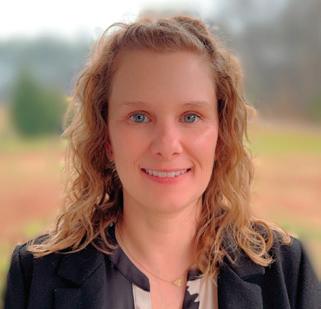


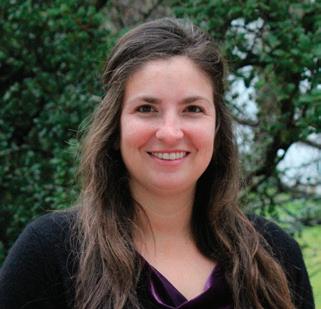
as a backup on forestry related policies. Henley previously worked as a Virginia Cooperative Extension agent in Powhatan County. She and her husband, Thomas, started the Virginia Farm Succession Professionals Network and have worked with the Agricultural and Forestal District Program.

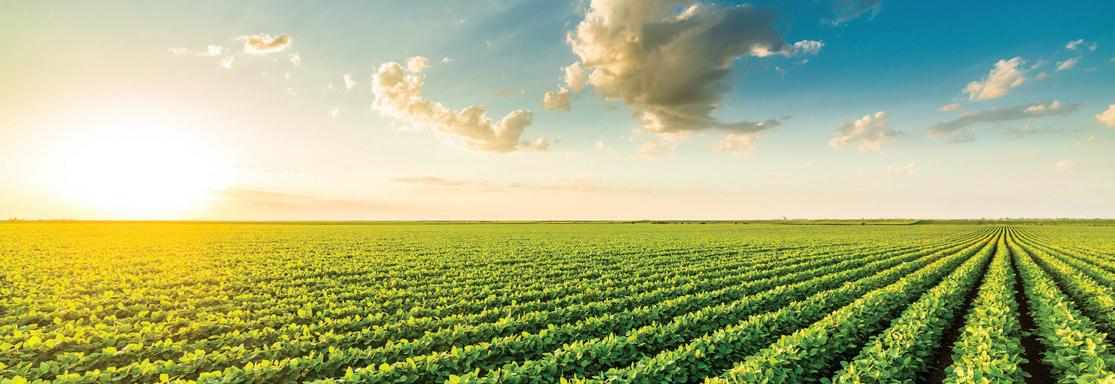
For more than 95 years, Virginia Farm Bureau Federation has collectively served as the state’s voice for farmers.
Farm Bureau producer members continue to determine what positions the organization takes on various legislation, and their professional staff consistently talk to legislators about those issues.
This year, a 40% turnover of seats in the General Assembly required extra efforts to connect with legislators who were unfamiliar with Virginia agriculture. VFBF advocates were encouraged to establish relationships with the 51 legislators who are new or previously served in the General Assembly in a different office.
Across the state last year, Farm Bureau members held regional roundtables with legislators to share information about agriculture’s most pressing issues. Additionally, on Jan. 29, VFBF members took advantage of the annual Legislative Day to brief lawmakers on agricultural priorities.
Those efforts led to Farm Bureau policy succeeding on 35 out of 42 issues for which the organization lobbied.
The final outcome of the bills is still subject to Gov. Glenn Youngkin’s action, which includes amending, signing or vetoing them. The governor’s actions were to be reviewed by the General Assembly on April 17.
Based on information available at press time, here is how 12 key VFBF-supported policy positions fared in the General Assembly.



means Farm Bureau policy prevailed
means Farm Bureau policy did not prevail
means Farm Bureau was neutral on the final action, or more work needs to be done on the issue to say Farm Bureau policy prevailed.

Fully funded Agricultural BMP Cost-Share program for next two years ✓
Supported increased staffing to support soil and water conservation districts with nutrient management planning and engineering ✓
Extended to 2030 the availability of refundable agricultural BMP tax credits for conservation practices and precision agricultural equipment ✓
Prevented removal of local government decision making over utility scale solar facilities ✓
Created an Office of Working Lands within the Virginia Department of Forestry to streamline resources dedicated to conserving working farms and forests ✓
Created a work group led by Board of Veterinary Medicine and state veterinarian to address the large animal veterinarian shortage ✓
Included monies for Forest Sustainability Fund and created equitable provisions for fund disbursement ✓
Increased funding to assist livestock farmers with wildlife damage ✓
Protected familial farm transition by preventing the reinstatement of the estate tax ✓
Created a “Virginia Verified Meat” label for livestock born, bred, raised and processed in the commonwealth ✓


Incentivized or determined incentives for development of solar generation in parking lots, on rooftops and on brownfields ✓
Maintained current minimum wage rates and regulations, including the longstanding farmworker exemption ✓
Although this year’s General Assembly session has ended, Farm Bureau’s work is never done. The organization is working to have staff or members appointed to boards and various technical advisory committees or participate in meetings to ensure the proper implementation of current legislation.
Additionally, members already have begun participating in
this spring’s regional policy development meetings to begin determining Farm Bureau’s policy positions for 2025.
If you are a producer member and do not receive Action Alerts but would like to, contact Tenille Nuckols, VFBF social media and member engagement coordinator, at tenille. nuckols@vafb.com or 804-290-1293.
Keeping the farm going sometimes requires the operator to leave it behind.
And 137 Farm Bureau members from 58 counties did that in January for Virginia Farm Bureau Federation’s annual Legislative Day at the General Assembly in Richmond. While there, they met with lawmakers and advocated in support for or opposition to legislation that affects agriculture.
Many urban and suburban legislative offices welcomed farmers to hear firsthand how wage issues and solar collection facilities on prime lands threaten operations.
There’s anxiety among farmers that urban representatives have a closed door to conversations about agriculture, said Martha Moore, senior vice president of VFBF governmental relations. However, positive relationships have been established with those state leaders through VFBF’s statewide series of roundtable discussions with farmers.
“And Legislative Day is just the next step in continuing to build that relationship,” Moore said. “These legislators have an open door to these conversations, even if we don’t agree on every issue.”
The day before the legislative visits, farmers met with Virginia House of Delegates Speaker Don Scott, D-Portsmouth, who said even though he’s an urban legislator, he grew up around farms.
VFBF AgPAC, a political action committee, endorsed Scott each term he has served in the Virginia General Assembly.
“We appreciate his willingness
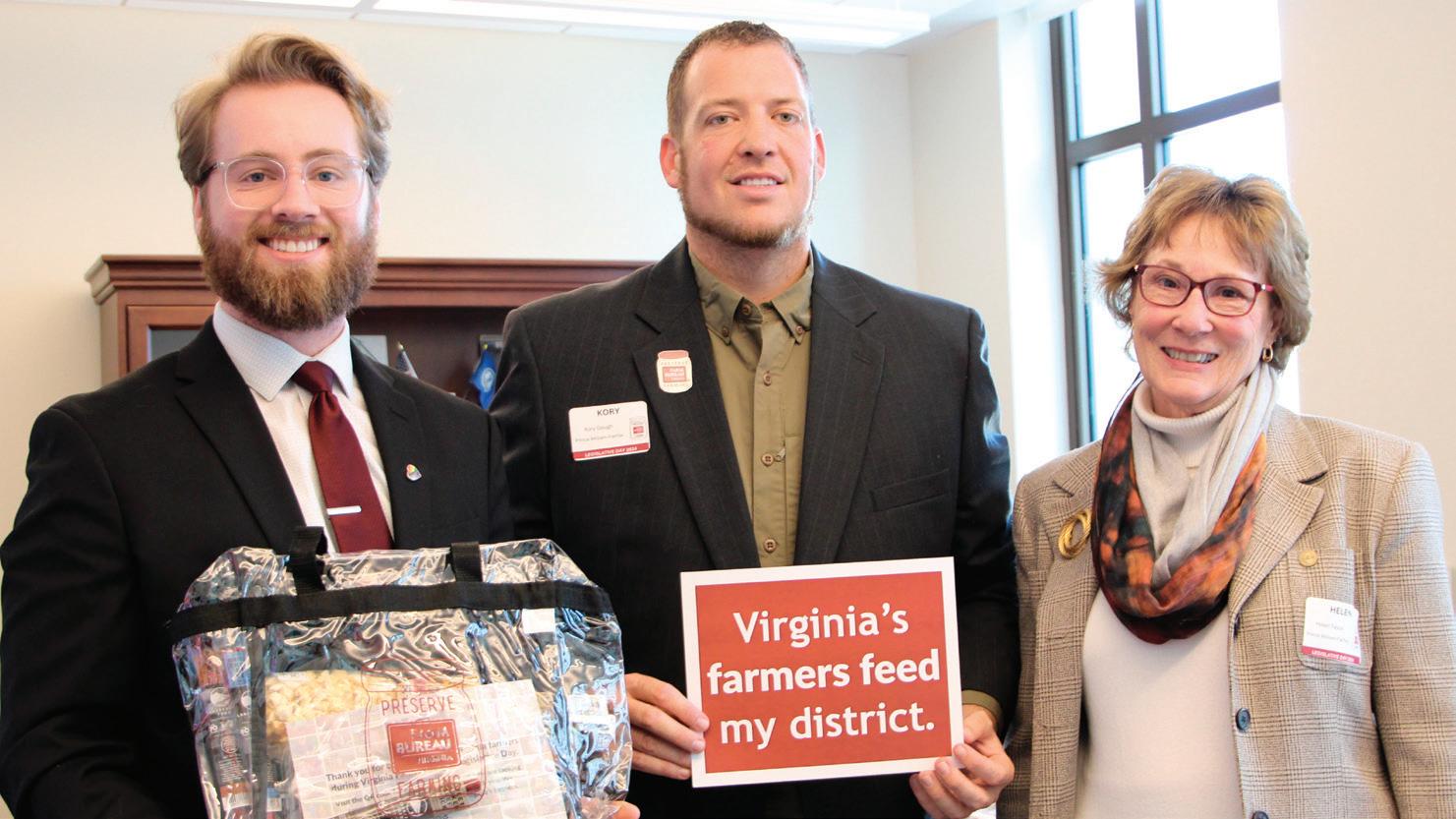
to help us facilitate conversations with other urban legislators and candidates,” said VFBF President Wayne F. Pryor. “He’s truly been a partner in bridging conversations with rural Virginians and urban legislators in our organization.”
On Legislative Day, complimentary snack bags packed with Virginiagrown, value-added agricultural products were distributed to each lawmaker.
Farmers from Northern Virginia met with the constituent services director for Sen. Russet Perry, D-Leesburg, a member of the Senate Agriculture, Conservation and Natural Resources Committee.
“I’m hoping Sen. Perry will vote no on taking away the local control of zoning for solar facilities,” said Loudoun County produce grower Avis Renshaw. “It’s crucial. Most of those facilities will go on open, easy land or forested land. Farms are the lowhanging fruit.”
While developing emission-free
energy sources is encouraged, “‘All politics is local’ is doubly true in this situation,” Renshaw added.
Farmers advocated for SB234 that promotes the installation of solar arrays only on parking lots.
Jakob Seely, a cattle and poultry grower and forestland owner, said Fauquier County farmers have proposed a local cap on solar projects. “It’s a plan to be pro-solar, with the least negative effects on farmland,” he said. But a loss of local control could upend that.
Farm Bureau is opposed to two House bills aimed at increasing the minimum wage to $15 by 2026 and eliminating wage exceptions for farmworkers. VFBF state board member Barry Bates of Essex County said mentoring youth in farmwork allows them to grow into higher wages with experience.
“You’re their teacher while paying them too,” he explained. “If we set wages at $15 off the bat, they may not have that opportunity.”
Interactions with national farm leaders and economists impart perspectives that bring the big picture into focus for Virginia farmers.
This was evidenced when a group of about 20 farmers, Virginia Farm Bureau Federation leaders, students and other stakeholders met with industry experts in Washington this winter to discuss the latest developments in agriculture.
They toured the highly secure U.S. Department of Agriculture’s National Agricultural Statistics Service headquarters, where the 2023 crop production report was released.
U.S. soybean and cotton production dropped a bit in 2023, while winter wheats, dry hay and alfalfa showed gains. But corn was king at record highs. A total of 15.3 billion bushels of corn was harvested in 2023, up 12% from 2022.
The Virginia delegation also visited American Farm Bureau Federation offices, where AFBF managing director of government affairs Ryan Yates said farmers still have work to do educating the public on the sources of their food. A recent poll showed that while Americans overwhelmingly trust farmers, fewer trust farming practices.
“That tells us people want to know more about where their food comes from, how it’s produced and the ways we do what we do,” Yates continued.
Joe Gilson, an AFBF government affairs director, shared a farm bill update. The omnibus spending package that funds food assistance and other crucial programs is debated and passed every five years and is currently delayed in Congress.
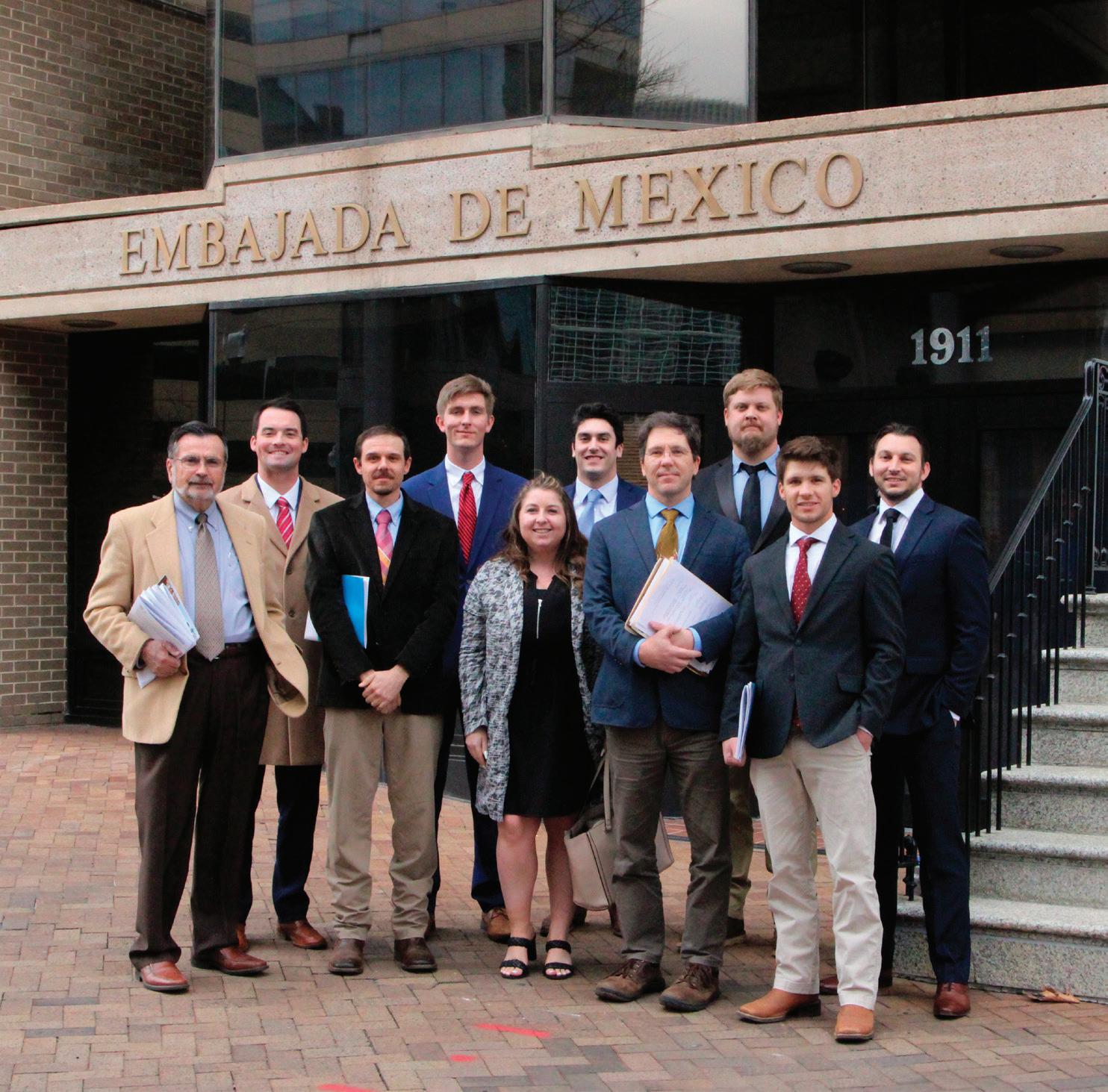
“I think our Farm Bureaus can get these folks to come together by saying, ‘Hey, we need a farm bill, we need it this year, and we need it to be bipartisan,’” Gilson said.
At the Embassy of Mexico, the entourage learned about the strong trade relationship between the two countries.
“I don’t think another two countries have that relationship,” said senior agricultural specialist Brenda Martinez after welcoming the first-ever group of Virginia agriculturalists to the embassy. “It’s very broad, sometimes complicated, but a beautiful and fascinating success story!”
Mexico is among the 10 largest export markets for Virginia’s farmsourced products—wheat, corn, pork, turkey and soybeans—and is the second largest importer of Virginia peanuts behind Canada. Top imports from Mexico to the commonwealth include infant foods, fruit, powdered milk, tomatoes, coffee products, nuts and chocolate.
Aside from Mexico-grown produce, beer and tequila are top U.S. imports, with tequila consumption doubling since 2019. Martinez said it’s become the second-most valuable spirit category in the U.S. Virginia is the 13th largest consumer of tequila domestically.
She said U.S. corn is extremely important for Mexico’s domestic food supply, with trade increasing exponentially since 2007. The average Mexican consumes about eight corn tortillas a day.
However, in 2020 a presidential decree—the equivalent of a U.S. executive order—was issued banning the importation of genetically modified commodities.
“With such a major importer of our corn, it seems to put that all at risk,” noted Andrew Smith, a Suffolk-based commodities merchandiser.
That decree was revised in 2023, Martinez said, only limiting the usage of white GMO corn for the tortilla industry.
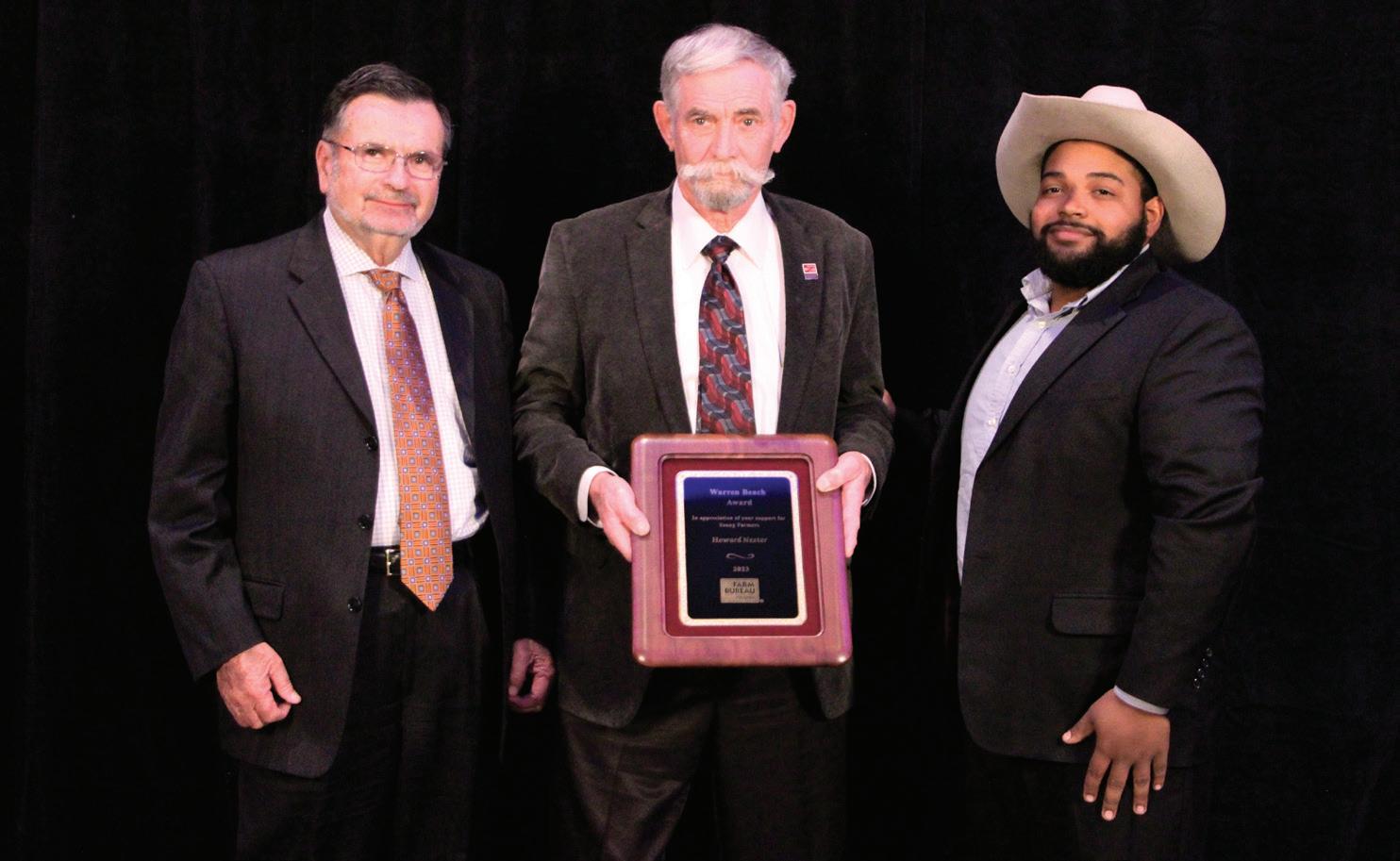
The Virginia Farm Bureau Federation Young Farmers Committee honored Howard Nester of Chesterfield County with its 2023 Warren Beach Award for his contributions to the VFBF Young Farmers Program.
Nester has served as Chesterfield County Farm Bureau president for over 20 years and is well known for his mission to create a strong organization to benefit young farmers.
“Mr. Nester’s commitment to ensuring the success and growth of the Young Farmers Program has been truly commendable,” said Michelle Fox, VFBF Young Farmers Committee chair. “Throughout his involvement with Farm Bureau, he has played a pivotal role in empowering young farmers to become leaders within our organization and industry.”
Nester was honored Nov. 28 at the VFBF 2023 Annual Convention in Virginia Beach. The Warren Beach Award is named for a veteran Farm Bureau leader whose support of young farmers is legendary.
In addition to his role as county Farm Bureau president, Nester currently serves on the VFBF Land Use Advisory Committee and the Virginia Farm Bureau Federation AgPAC Board of Trustees and was previously a member of the VFBF Bylaw Review Committee. He also chaired several former Chesterfield Farm Bureau committees, including the organization’s Local Evaluation Committee and its Legislative Action Committee, and he served as coordinator of the Chesterfield Farm Bureau Local Affairs Committee.
Under Nester’s leadership, Chesterfield Farm Bureau has sponsored the VFBF Young Farmers Achievement Award and offers a scholarship to a county student enrolled in Virginia State University’s College of Agriculture. Highly active in his community, he also facilitated a countywide Learning Barn donation initiative through which 38 local elementary schools received a barn-themed bookshelf stocked with educational children’s books about farming and food.
The application deadline for young farmers interested in competing for the 2024 Virginia Farm Bureau Federation Young Farmers Achievement Award and Excellence in Agriculture Award is April 30.
The Achievement Award recognizes outstanding young farmers for their business success and volunteer involvement, while helping them evaluate their business plans and set goals to strengthen their farming operations.
The state winner will receive a utility vehicle courtesy of VFBF and Southern Farm Bureau Life Insurance Co.; $2,000 courtesy of Chesterfield County Farm Bureau, Farm Credit, and VFBF Young Farmers; and a travel package to the 2025 American Farm Bureau Annual Convention in San Antonio, Texas, to compete for national honors. The runner-up also receives a travel package to the AFBF convention and $750. Finalists are awarded $500.
The Excellence in Agriculture Award recognizes individuals and couples for involvement in supporting agriculture, leadership ability, and involvement and participation in Farm Bureau and other organizations.
The state winner will receive a Kubota or similar utility vehicle courtesy of Virginia Farm Bureau Mutual Insurance Co., $500 courtesy of Montgomery County Farm Bureau, and a travel package to the AFBF convention. The runner-up also receives a travel package to the AFBF convention, and finalists are awarded $500.
For complete rules and registration forms, visit vafb.com/ Supporting-Farmers/Farmers-inAction/Young-Farmers or email kelly.roberts@vafb.com.
Young farmers learned the power of communication in securing farming’s future during the 2024 Virginia Farm Bureau Federation Young Farmer’s Winter Expo—carrying their voices all the way to the Virginia Capitol.
The Feb. 22-24 expo, themed “Farming on the Fringe,” explored bridging the urban-rural divide. The event brought 185 young farmers from across the state to Richmond for a weekend of networking, workshops and more.
During the opening day’s visit to the General Assembly, participants learned the importance of sharing their stories amid the largest turnover of state legislators in Virginia’s history.
“We have a lot more people that don’t know who we are as an organization, they don’t know what you do, but they want to learn,” said Martha Moore, senior vice president of VFBF governmental relations.
“There’s no better way to have your voices heard than to be on the front line,” remarked Virginia Secretary of Agriculture and Forestry Matt Lohr. To amplify their voices, he encouraged young farmers to seize opportunities to run for public office.
Serving as ambassadors of Farm Bureau’s efforts to build relationships with legislators, young farmers delivered Virginia Agriculture in the Classroom’s Book of the Year, Logan’s Greenhouse, and related lesson plans to state senators and delegates. They encouraged the legislators to read the book and donate the packets to a school in their districts during Agriculture Literacy Week, March 18-22.
Young farmers also prepared Agriculture Literacy Week kits

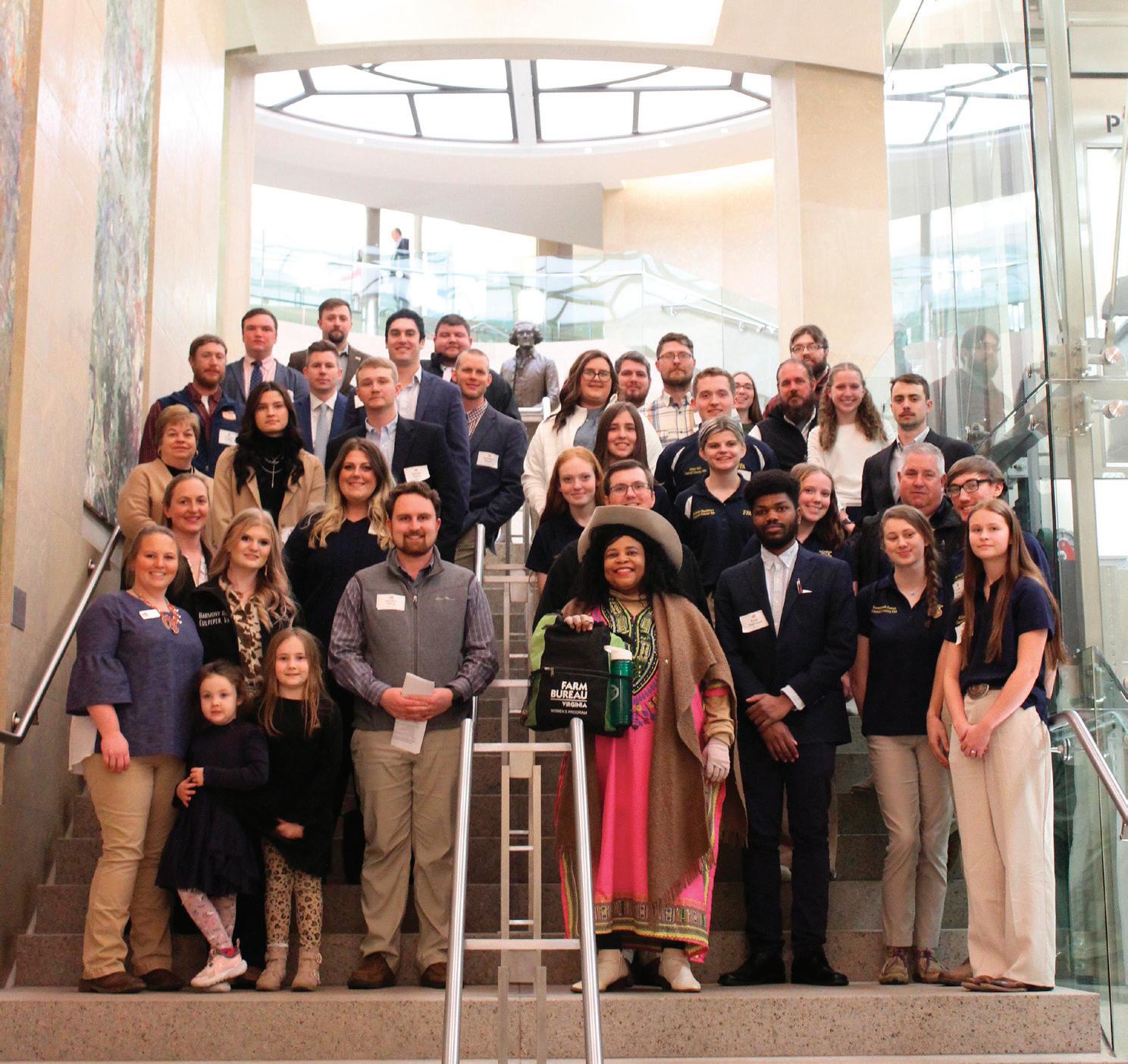
for donations to Richmond Public Schools for the expo’s service project.
Thursday’s dinner at The Meadow Event Park in Caroline County furthered connections with state leadership. Attendees heard from Del. Nadarius Clark, D-Suffolk, vice chair of the House Agriculture, Chesapeake and Natural Resources Committee and the youngest Democrat ever elected to the General Assembly.
The expo’s keynote speaker, Vance Crowe, explored the power of communication when approaching farm succession, legacy and other difficult topics with elders. He
founded Legacy Interviews, which interviews family members to preserve their history and pass down information to the next generation.
Crowe’s tactic for promoting positive, productive conversations with family members is to understand each other’s unique stories and perspectives.
“I’ve come to the very real conclusion that telling your own stories and getting people to open up literally changes what they see. … It will empower you to have conversations with your loved ones that you’ve never been able to have before,” Crowe said.
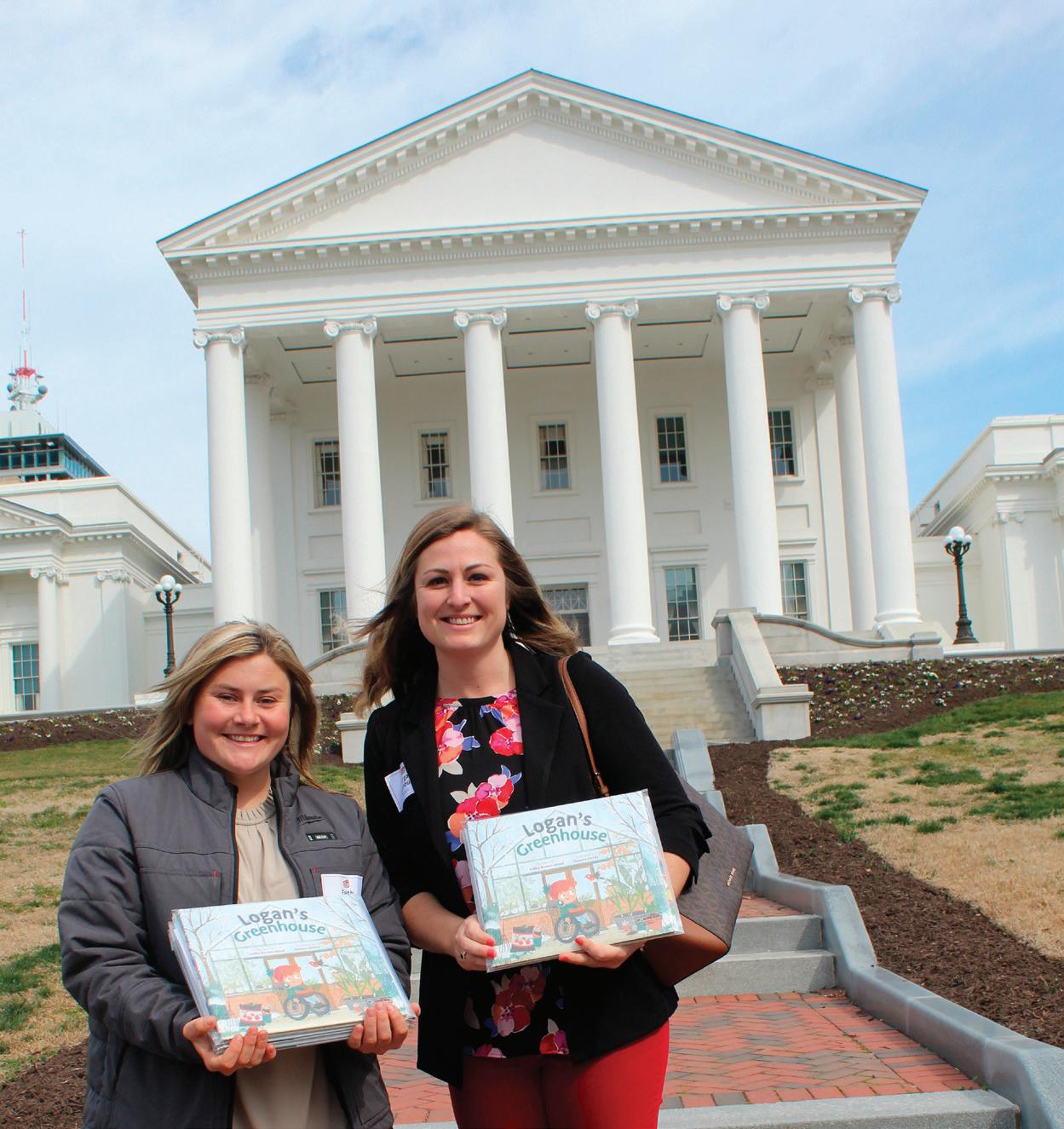
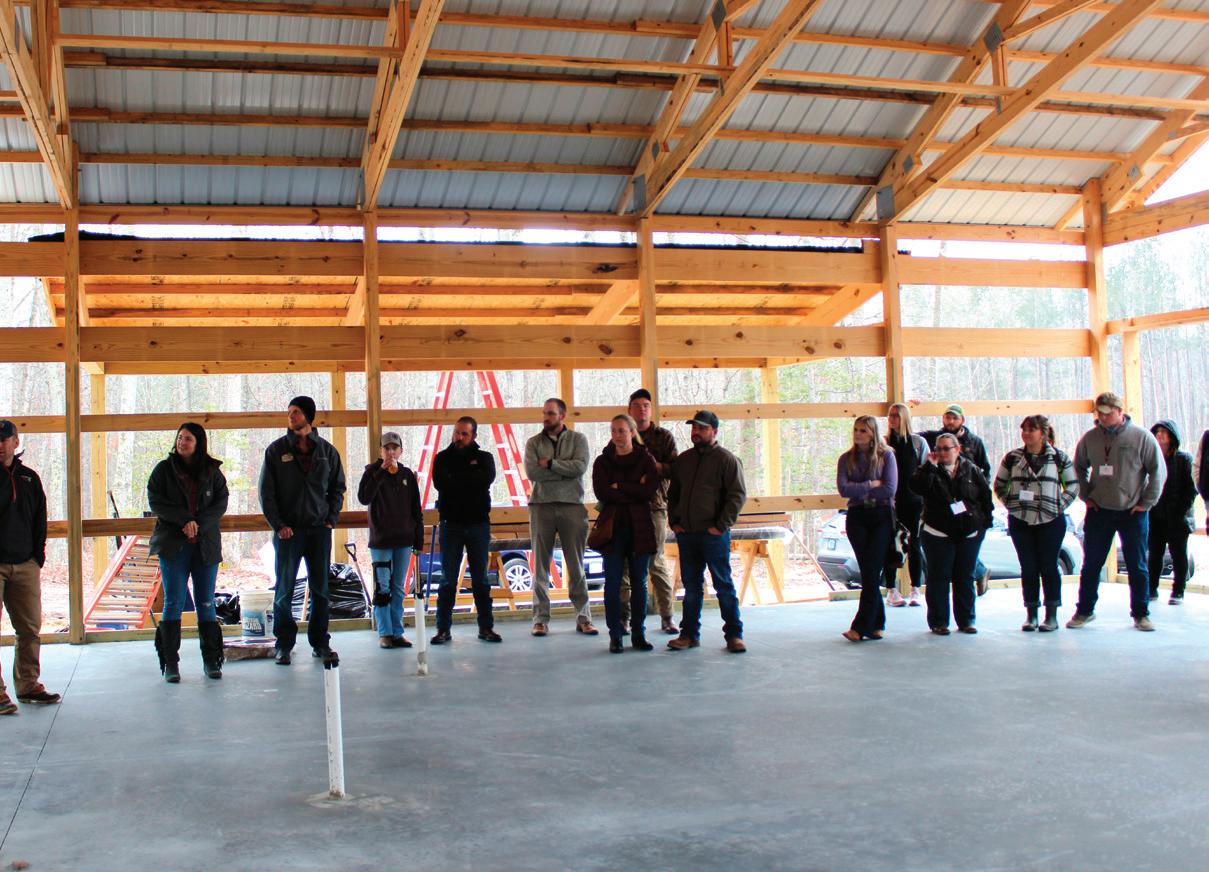
Workshops tackled other relevant topics for young farmers, including navigating the land access maze, developing sustainable business plans and finding mentorship in VFBF’s revived Growing Leaders program.
Tours of area farming operations, including Greenswell Growers, Greenwood Christmas Tree Farm and James River Agribusiness, offered a unique glimpse of agriculture that thrives in urban and suburban areas.
“Getting some extra education on different facets of farm life and meeting like-minded individuals my age was exciting,” remarked first-
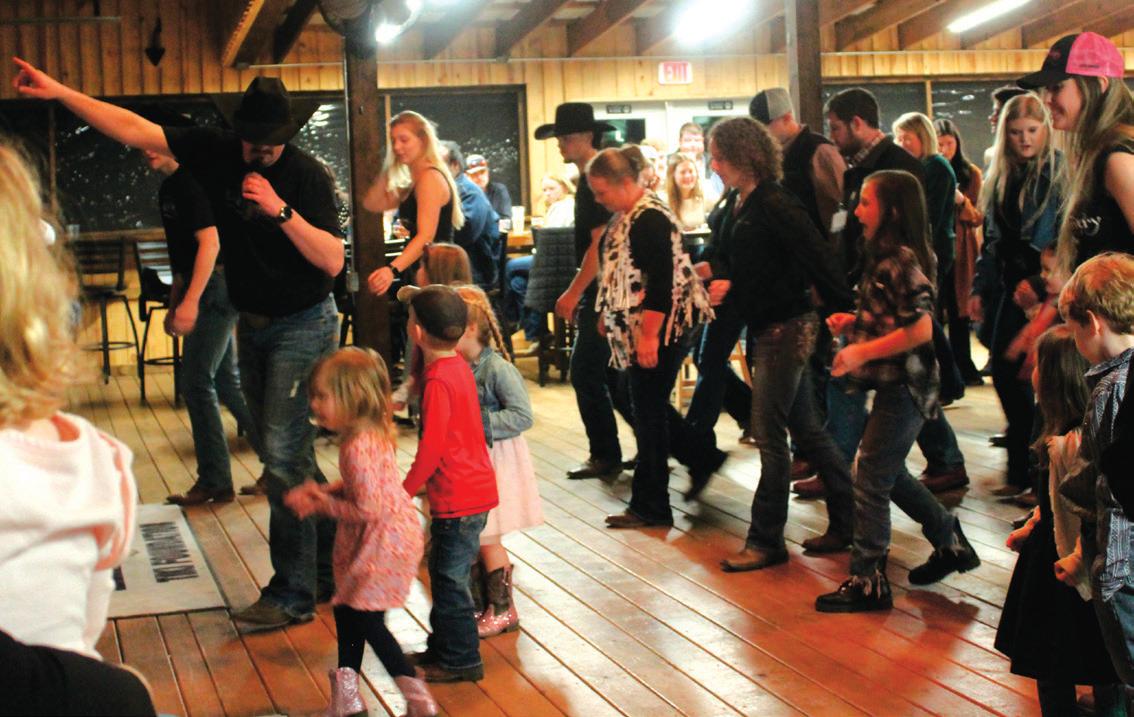
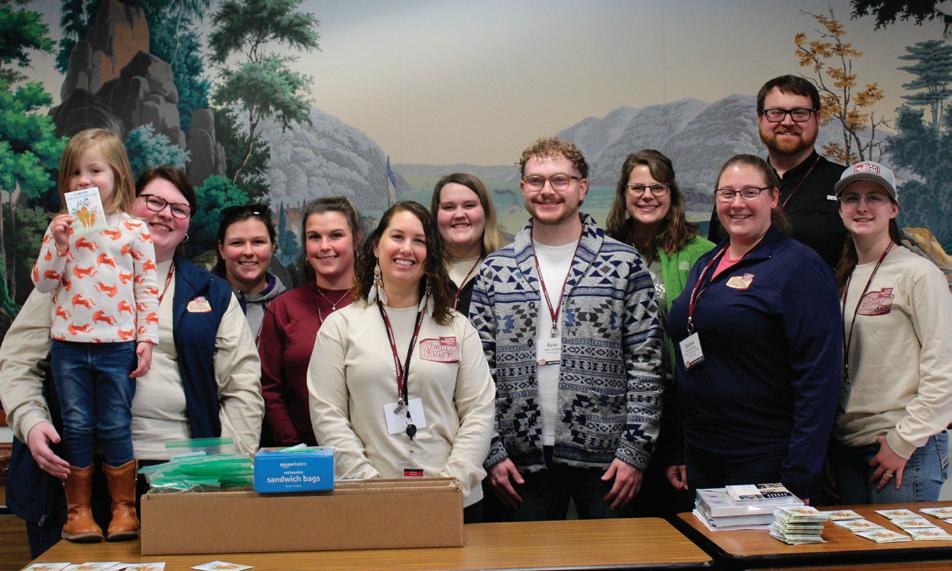

time expo attendee Stella Bradford of Orange County. “After COVID and a few years on the farm, I haven’t really gotten the chance to branch out, so it’s been a really great experience.”
save the date!
The 2024 Young Farmers Summer Expo will be held in Nelson County and Lynchburg July 26–28.
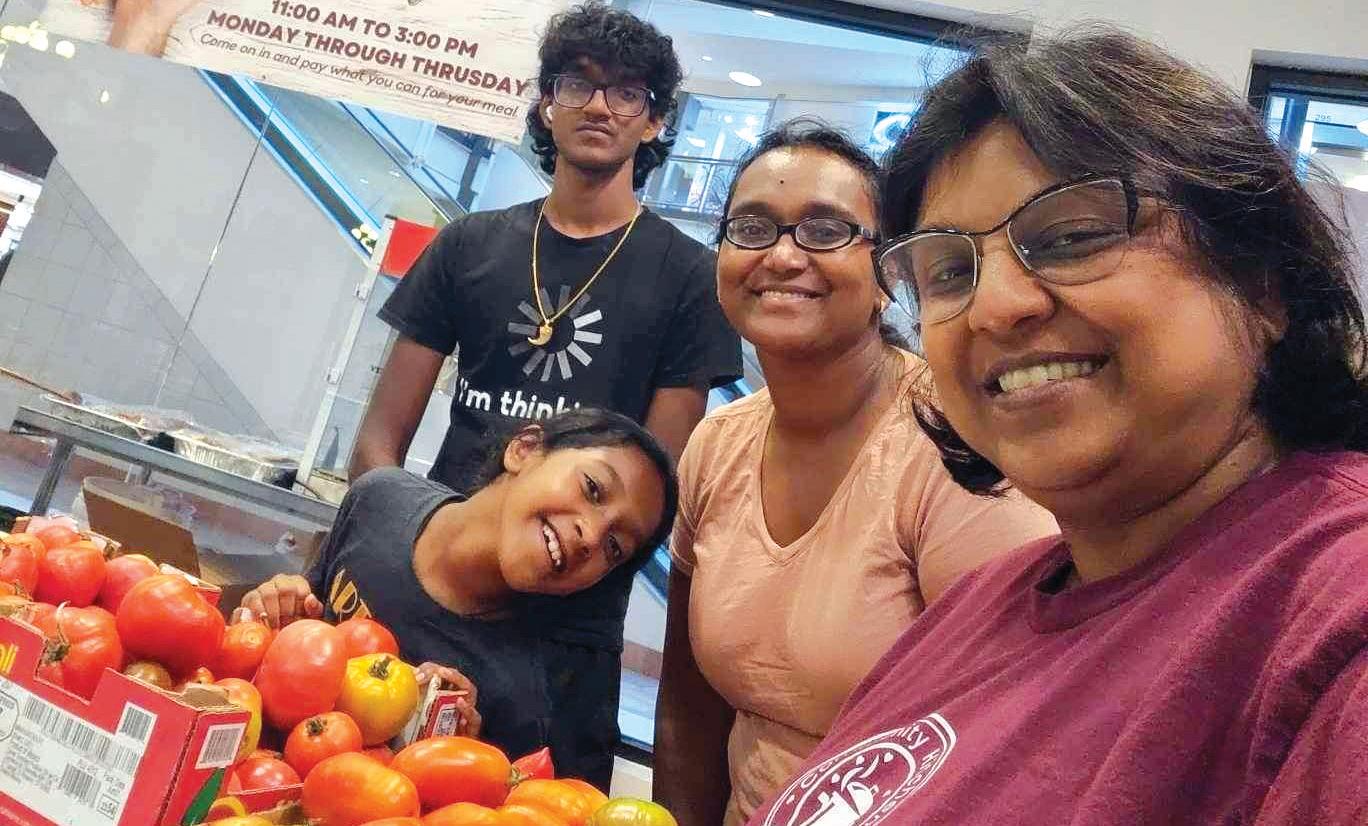

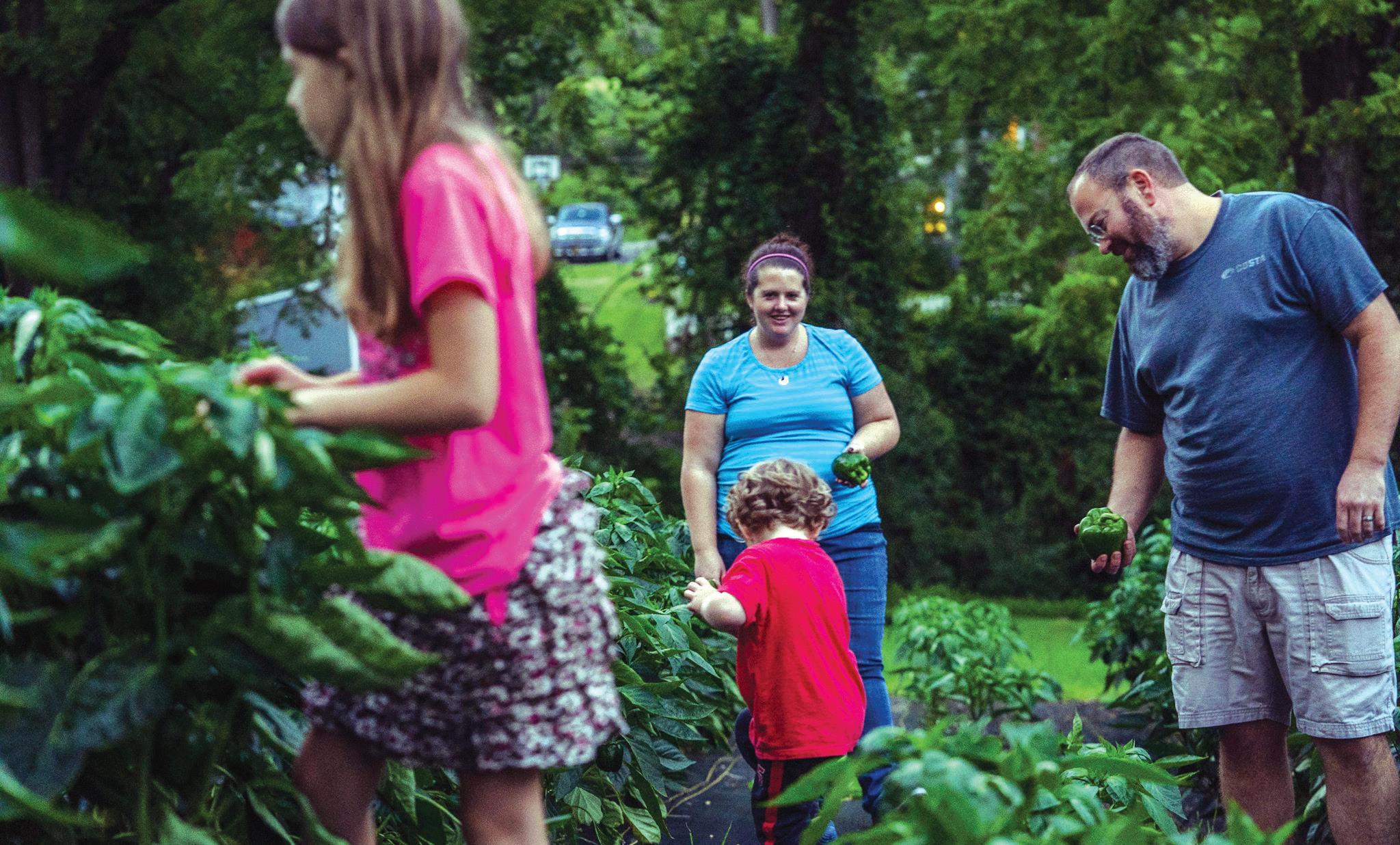
Resilience is the name of the game for today’s beginning and young farmers.
A recent National Young Farmers Coalition survey reveals a new generation of farmers answering the call to provide healthy food, preserve the land and cultivate community well-being by building diversified, resilient operations.
Findings also spotlight urgent structural challenges standing in the way of their success. The obstacles include student loan debt, climate change, immigration issues and access to land, capital, affordable housing and federal programs.
Tackling startup challenges alone can be “overwhelming,” as first-generation farmer Swathi Gaddam learned after leaving a lucrative job in information technology to pursue her calling.
“I just kept telling myself, ‘I have nothing to lose.’”
Gaddam’s drive to succeed led her to the Fauquier Education Farm, where she enrolled in the “life-changing” Northern Piedmont Beginning Farmer and Rancher Program. It offers two multi-week courses for those who are new to farming or just dreaming of starting a farm.
The program is part of the Virginia Beginning Farmer & Rancher Coalition, which aims to improve opportunities for beginning farmers to establish and sustain viable agricultural operations and communities.
Gaddam’s learning continues in Fauquier Education Farm’s New
Swathi Gaddam, center, and her family donate produce from what they grow at the Fauquier Education Farm. SWATHI GADDAM FAUQUIER EDUCATION FARM ABUNDANT ACRES FARM Dustin and Brittany White and their children pick vegetables on their Abundant Acres Farm in Fauquier County.Farmer Incubator Program. This course is for those who are ready to start commercial vegetable or cut flower production but don’t own land or equipment.
The program sets up participants for success with ongoing mentorships, hands-on experience with onsite plots and direct sale opportunities at the Warrenton Farmers Market. It also helps participants develop sustainable business plans.
The VSU Small Farm Outreach Program features a beginning farmer program with a similar holistic approach.
“You’ve just got to give yourself permission to keep going after something doesn’t work—try it again, try it differently,” said Jim Hankins, director of Fauquier Education Farm.
Gaddam discovered the value of starting small and finding her niche when starting up her business near Washington, D.C. She shifted her focus from flowers to an untapped market for locally grown South Asian vegetables.
Program graduates Dustin and Brittany White of Abundant Acres Farm in Warrenton shifted their initial business plan from protein to produce. They eventually incorporated value-added products like hot sauces, seasonings and jellies, which kept the still-growing business afloat during last year’s drought.
“Have plans A-F when you get started so you have plenty to fall back on and not get discouraged when one doesn’t work,” Dustin advised.
Roger and Dr. Amanda WeakleyScott, the 2021 Virginia Farm Bureau Federation Young Farmers Achievement Award winners, had to “scrounge up lots of capital” when starting their now-multiple farm enterprises.
“And navigating the ‘alphabet soup’ of resources online can get overwhelming fast,” Amanda noted.
She recommends first writing up a business plan and then sitting down with Virginia Foundation for Agriculture, Innovation and Rural Sustainability to identify opportunities for grant funding. She also recommends meeting with an accountant and attorney to help navigate the setup process.
The Scotts utilized U.S. Department of Agriculture Farm Service Agency loans, but issues with timeliness can be prohibitive—especially for those looking to secure land.
Amanda encourages land seekers to utilize the Virginia Farm Link Program to connect with retiring farmers and landowners.
Some young farmers are seeking long-term solutions to secure the future of farming in their communities.
Loudoun County Farm Bureau Young Farmers received national recognition for voicing concerns about overdevelopment and under-regulation to county leaders.
“We’ve got new threats to prime farmland and agriculture’s future all the time—it seems like there’s a new battle to fight every month,” remarked Pam Jones, chair of the county’s Young Farmers Committee.
According to the most recent U.S. Census of Agriculture, almost 11,000 farm acres in Loudoun County and half a million statewide were lost between 2017 and 2022.
Loudoun’s young farmers continue to push for a purchase of development rights program, protection for prime agricultural soils when cluster subdivisions are proposed, and programs for area beginning farmers.
“I think there will be a conduit of young people interested in getting into ag, but we want to make sure there’s resources available to them when they’re ready,” said Chris Van Vlack, a Loudoun County Farm Bureau board member.
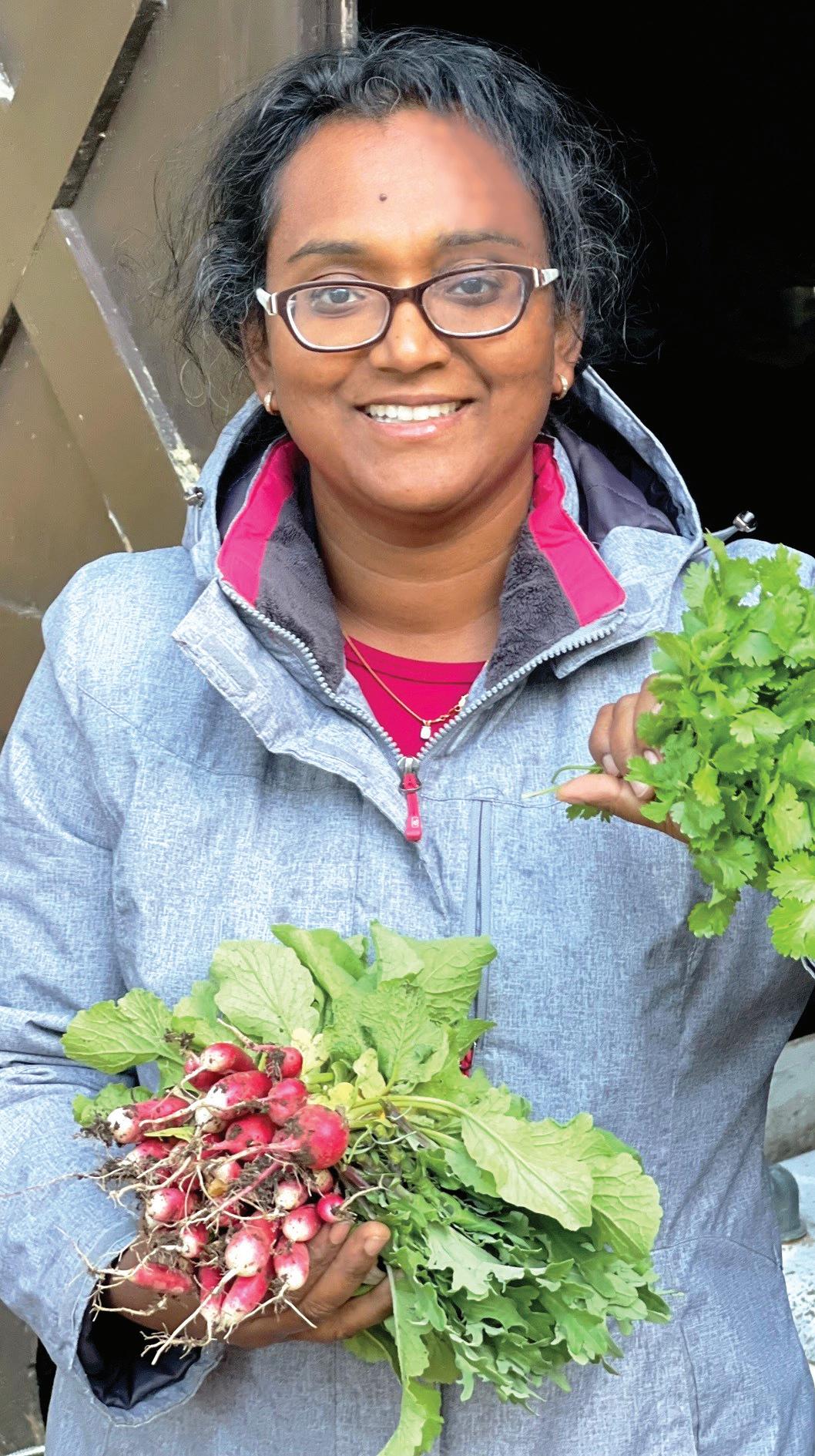
The Virginia Farm Link Program features an online database, provided at no cost to users. The site is designed to link farm owners interested in exiting agriculture with those seeking farms and farm businesses.
Farm seekers can access a list of available farmland statewide, and see farm profiles and contact owners by logging in or creating a profile.
Farm owners can access a list of farmers seeking land, and see their full profiles and contact them by logging in or creating an account.
Users also can post their own farms or farm seeker profiles.
Other program services include assistance with farm transition and succession planning; information on innovative farming methods and techniques; and research on agricultural, financial, marketing and other matters.
Visit virginiafarmlink.org for more information.
Swathi Gaddam shows off radishes she grew through Fauquier Education Farm’s New Farmer Incubator Program.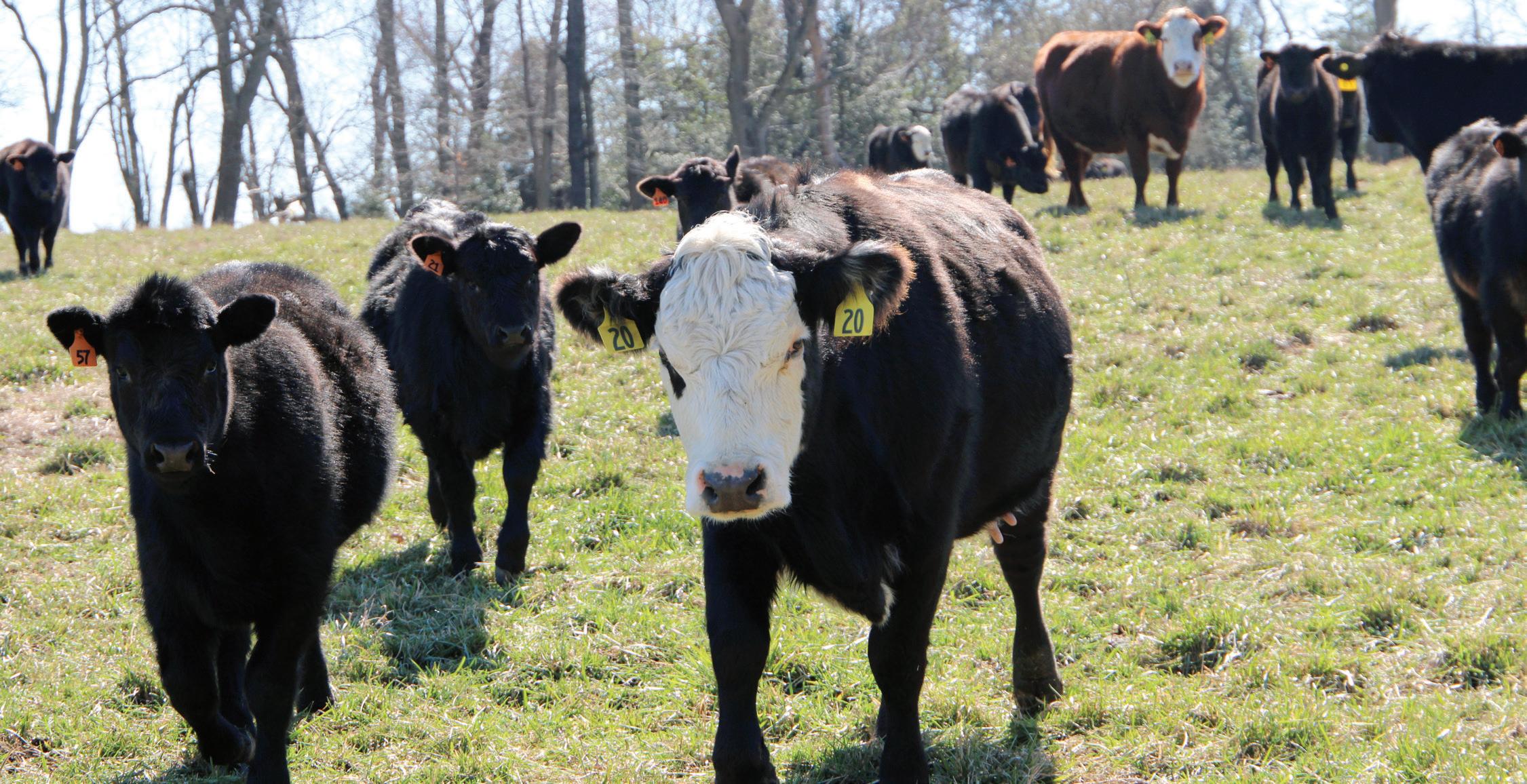
Virginia cattlemen know they’re growing exceptional beef using humane practices paired with science-based health and nutrition plans. As beef demand continues to grow, farmers want consumers to share in their expectation of quality with confidence in product safety and sustainability.
Those farmers have support in providing the best beef possible. Industry newcomers, multigenerational beef growers and youth producers alike have opportunities to expand their production knowledge, increase consumer confidence and strengthen farm profitability through the Virginia Beef Quality Assurance program.
Educating beef producers, including lifelong cattlemen, on the most trusted techniques in herd and resource management is still full of a-ha moments.
“I never knew how to do that,” is one remark Phil Blevins hears all the time.
The Virginia Cooperative Extension agent in Washington County has been working with farmers on best practices for 25 years. He coordinates regional training sessions for growers seeking Virginia BQA certifications or recertifications.
A state division of the nationally coordinated Beef Quality Assurance program, Virginia BQA provides systematic information to beef producers and consumers of how husbandry techniques can be coupled with accepted scientific knowledge to raise cattle under optimum management—all with a focus on controlling environmental impact.
Virginia BQA certification is earned at no cost to farmers, through a live or online training and test, followed by chute-side instruction.
“Getting certified can only positively impact your operation,” said Lisa McCormick, Virginia Beef Center of Excellence coordinator
at Virginia Tech, who works with Virginia Cooperative Extension agents statewide to administer the Virginia BQA program on the local level.
“And it better ensures that beef will always be one of the main protein sources on the table!”
Funded by the Beef Checkoff program, Virginia BQA was established in the ‘90s. Born in the 1985 Farm Bill, the Beef Checkoff assesses $1 per head on the sale of live cattle for promotion, consumer and industry information, research and foreign marketing efforts to drive beef demand.
The Virginia Beef Council administers the 50 cents retained in Virginia.
“It brings more consumers and customers to the table,” McCormick said.
More than 85% of U.S. beef comes from BQA-certified farmers.
Almost 7,400 beef producers are Virginia BQA-certified.
Level 1 Certification is earned in a
ARTICLE AND PHOTOS BY NICOLE ZEMA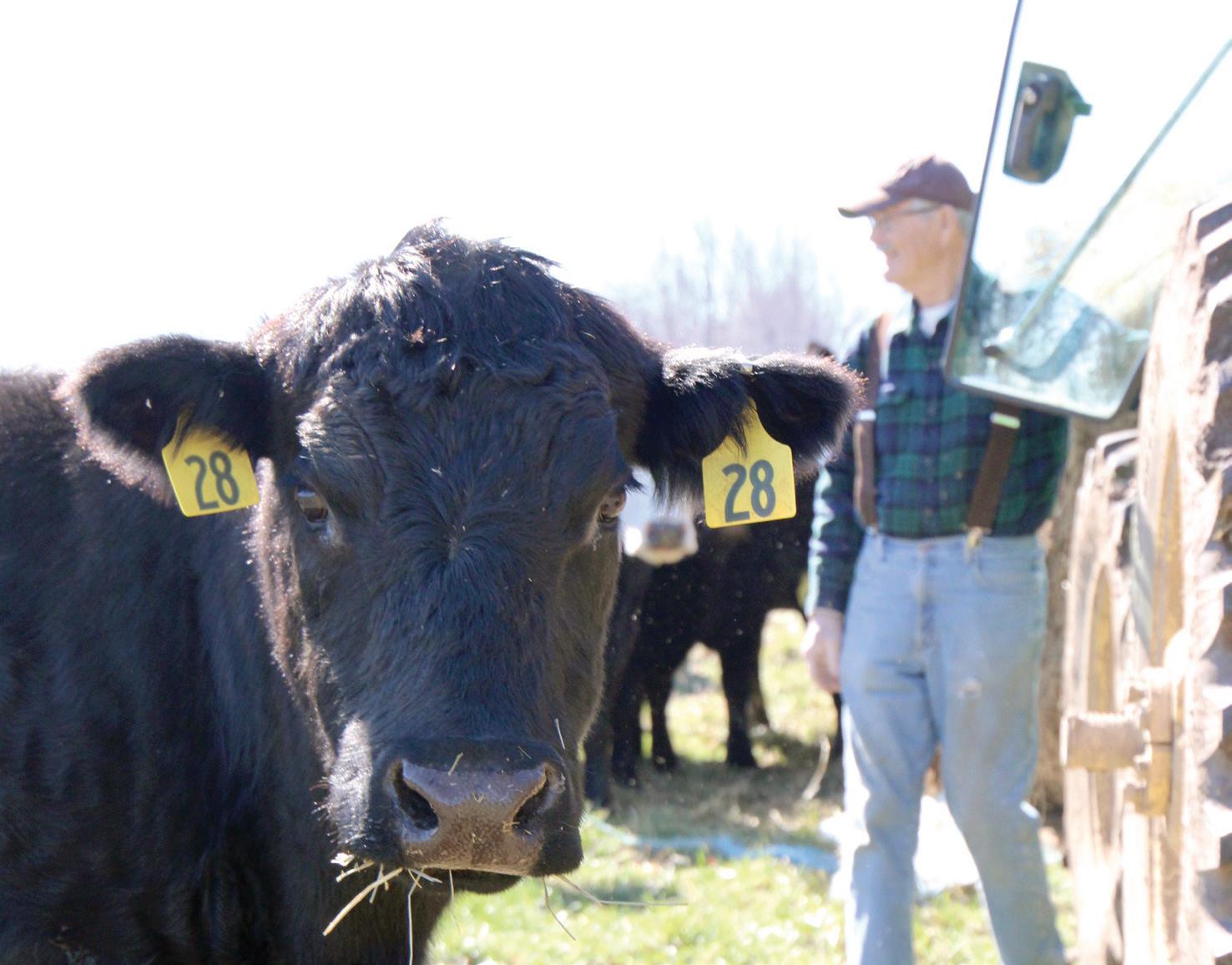
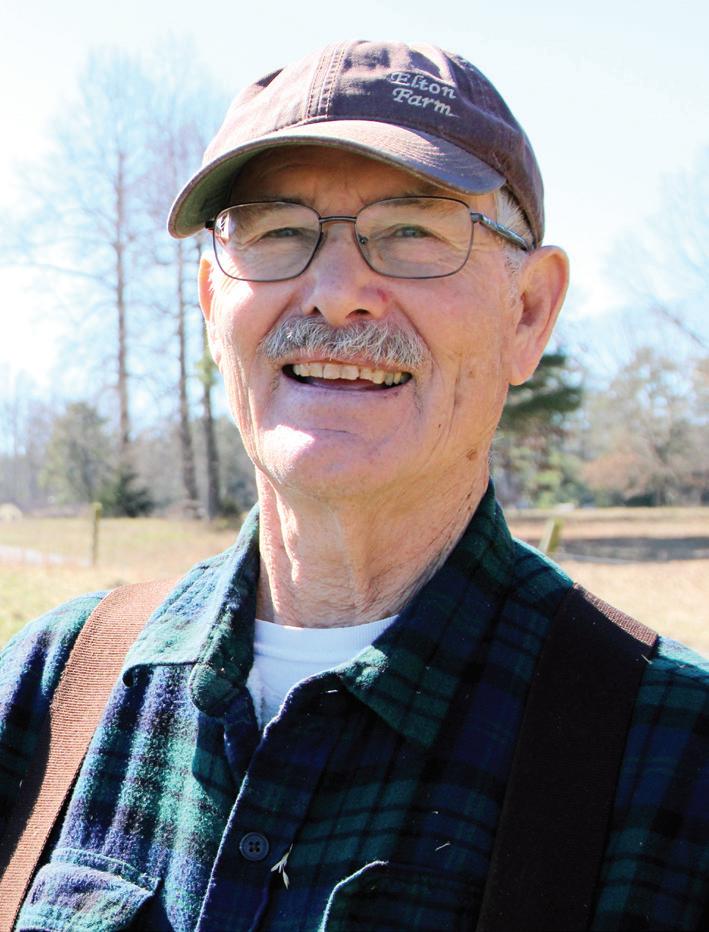
classroom setting, with an overview of the BQA manual and guidelines. It focuses on the best management practices certified producers follow— from feedstuffs and preventive health programs to proper injection site locations and record keeping. Or, participants can complete the 4-hour online program found on the National BQA website.
Level 2 Certification requires a hands-on, chute-side training and cattle handling session, informing producers on proper vaccine administration, antibiotic use and drug safety.
The three-year recertification can be completed online or in person.
Improper injection technique can cause tissue damage, which results in loss at processing.
“One of the focuses of the training is proper injection administration in the neck as well as other things that may cause issues down the road,” Blevins said.
Plus, certification is one of the
requirements to participate in the VQA feeder cattle marketing program.
Many cattlemen were drawn to certification because of a popular perk—access to the feeder cattle marketing program called Virginia Quality Assurance. In the VQA program, feeder calves are pooled from multiple farms.
Virginia Department of Agriculture and Consumer Services personnel then grade the calves and group them into tractor-trailer-size lots according to frame size, muscle thickness and health assurance.
Pooling cattle from several farms maximizes trailer space, which results in improved trucking rates and a lower carbon footprint. The cattle are handled in ways that minimize stress and injury.
Trucking prices are a major disadvantage for smaller-scale producers, noted Brandon Reeves,
executive director of the Virginia Cattlemen’s Association.
“Those without enough cattle to market a load lot can sell groups at the same time in load lots of similar size,” he said. “And that brings a premium.”
The Virginia Cattle Industry Board offers a host of grant opportunities for local marketing and promotions programs including VQA, awarding tens of thousands to cattlemen’s associations statewide, funded by the state checkoff.
Earn your Virginia BQA certification
Visit virginiabqa.org to learn more about the program.
Contact your local Extension office to get started, or call McCormick at 540-231-2792 for more information.
To learn more about Virginia Quality Assurance feeder cattle market program, call 540-992-1009 or visit vacattlemen.org
Dr. John Haile, secretary-treasurer of the Eastern Virginia Cattlemen’s Association, operates a cow-calf operation at Elton Farm in Essex County, and has participated in the Virginia BQA and VQA programs since their inception.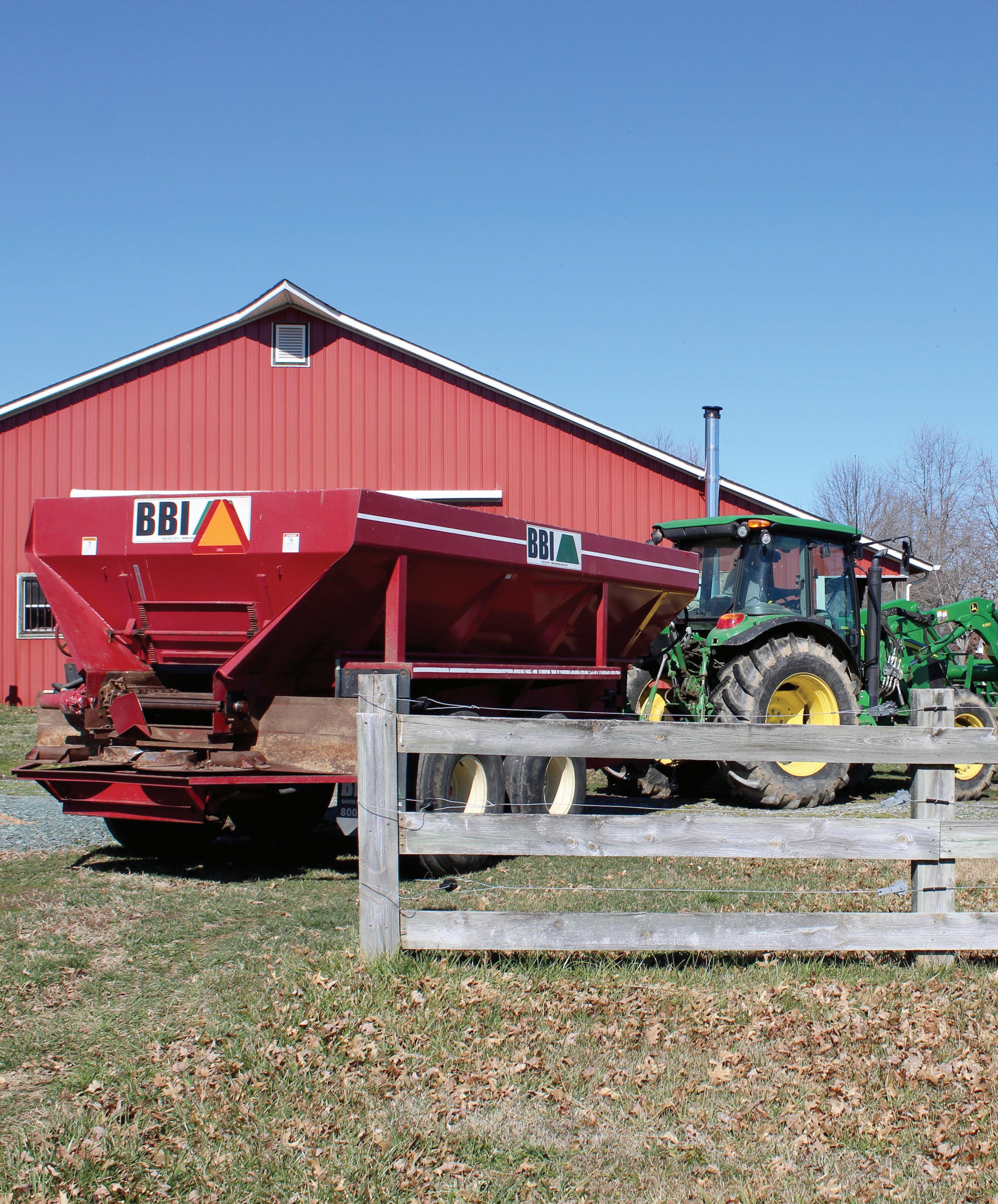
Buying specialized farm equipment costing tens of thousands of dollars—or more—can be a daunting prospect for farmers. And for many new and small-scale operators, the investment is simply out of reach.
That’s why a couple of county Farm Bureaus decided to expand the services they offer. They began loaning farm equipment to producer members, giving them access to an essential resource without a heavy debt burden—allowing them to focus their finances on other farm priorities.
“Some farmers don’t want to spend $30,000 on a piece of equipment they’re maybe going to use one week out of the year,” said Lucky Graves, president of Madison County Farm Bureau.
Madison Farm Bureau owns a 20-foot pull-type litter spreader it rents out to local farmers. The organization originally purchased the litter spreader through a grant from the Virginia Poultry Federation, which aimed to facilitate poultry litter distribution from the Shenandoah Valley to deficit areas like Central Virginia. Small farmers may be able to purchase trailer loads of litter, but finding someone to spread it can be challenging.
“This is a benefit to them to be able to spread their litter and put nutrients back into their soil,” Graves said. “It saves them a lot of money, and it works out well.”
When spring planting is in full swing, the litter spreader traverses the county, traveling from farm to farm as producers book it for a couple days or a week at a time to fertilize their fields.
“We’ve already had several people ask about it this year,” Graves said. “I have a feeling this will be a busy spring for it.”
And with that high demand comes careful management to ensure the equipment stays in good condition.
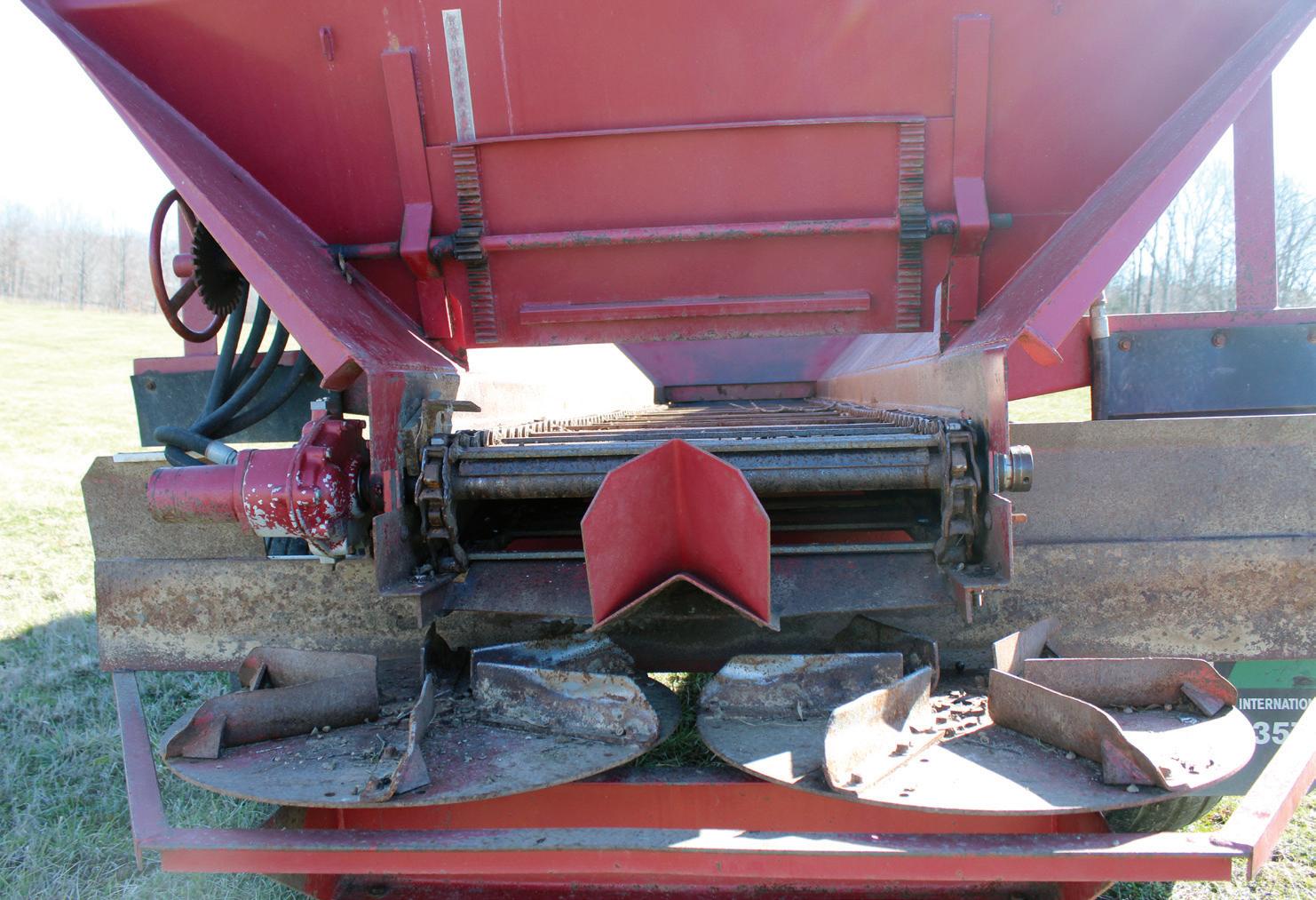
“It has to be used for litter only,” explained C.T. Thiemann, president of Louisa County Farm Bureau. “These spreaders can spread other materials, but ours is specifically for litter only.”
Louisa County Farm Bureau also owns a litter spreader that’s rented to Farm Bureau members. So the county Farm Bureau can track its usage, farmers must have proper hauling equipment and report where the litter came from, and how many tons of litter were spread on how many acres.
While the county Farm Bureau office staff manage the spreader’s reservations, scheduling and record keeping, it’s housed at Thiemann’s farm, where he handles general maintenance from wear and tear. If something small breaks while it’s rented, farmers typically try to fix it themselves before returning the equipment. Thiemann handles major repairs like replacing a pump or floor chain.
“We try not to burden the user with that,” he said.
Thiemann acknowledged that maintaining the litter spreader can be a balancing act with his own farm’s commitments. There are times he might need to make onsite repairs and
help educate the occasional farmer on mechanics. But it can be a worthwhile service knowing it supports area farmers and the community, including beginning and young farmers.
“It’s normally the smaller, 40- to 50-acre operations that’ll use it,” Thiemann said. “I’ve rented it myself a few times. It’s an additional service that’s not available anywhere else in our county—we’re the only ones that rent out a litter spreader.”
While the poultry federation grant helped with the initial litter spreader purchases, ongoing equipment maintenance, insurance costs and administration are the county Farm Bureaus’ responsibility. The daily rate farmers pay for renting the equipment goes toward its upkeep.
And if there happens to be a surplus after a busy spring, that money is invested in the local farming community to support the next generation.
“It’s used for scholarship money,” Graves said. “We buy animals from kids in 4-H and FFA and give scholarships to students going to school for agriculture.”
Legislation passed in 2023 to clarify and improve Virginia’s unlicensed farm use vehicle program administered through the Department of Motor Vehicles. Now enforceable July 1 of this year, these changes address past misuse of the program, while clarifying exemptions.
Farm vehicle tags offer an alternative to identify vehicles that aren’t required to have registration.
Virginia Farm Bureau Federation’s Governmental Relations Department is in frequent contact with DMV leadership on program updates. New tags are available now at the DMV, and farmers have taken action ahead of the July 1 enforcement.
“Just at the beginning of January, Virginia DMVs had sold 517 placards,
averaging 172 sales a month,” said Katelyn Jordan, governmental relations local and state advocacy specialist.
A title is still required for any pickup truck, panel truck and sport utility vehicle claiming the farm use exemption. Should you need a title, a $15 titling fee will be imposed. Each placard is $15, valid for the life of the vehicle, but nontransferable. No sales and use tax will be imposed on exempt vehicles, but liability coverage is required.
Vehicles required to obtain a Permanent Farm Use Placard from the DMV include pickup trucks, panel trucks and SUVs with a gross weight rating of less than 7,500 pounds.
Trailers, semitrailers and vehicles
(including pickup and panel trucks with a gross weight vehicle rating over 7,500 pounds) will continue to qualify for the farm use exemption but will only need to display the traditional red and white farm use sign available for purchase at farm supply stores.
The clarified law also limits the information needed for the application. Now farmers will report approximate farm location and acreage where the vehicle is used; types of agricultural commodities produced; and a signed statement explaining the vehicle will only be used for exempt purposes.
NEED MORE DETAILS?
Contact VFBF Governmental Relations staff at 804-290-1014 or email governmentalrelations@vafb.com
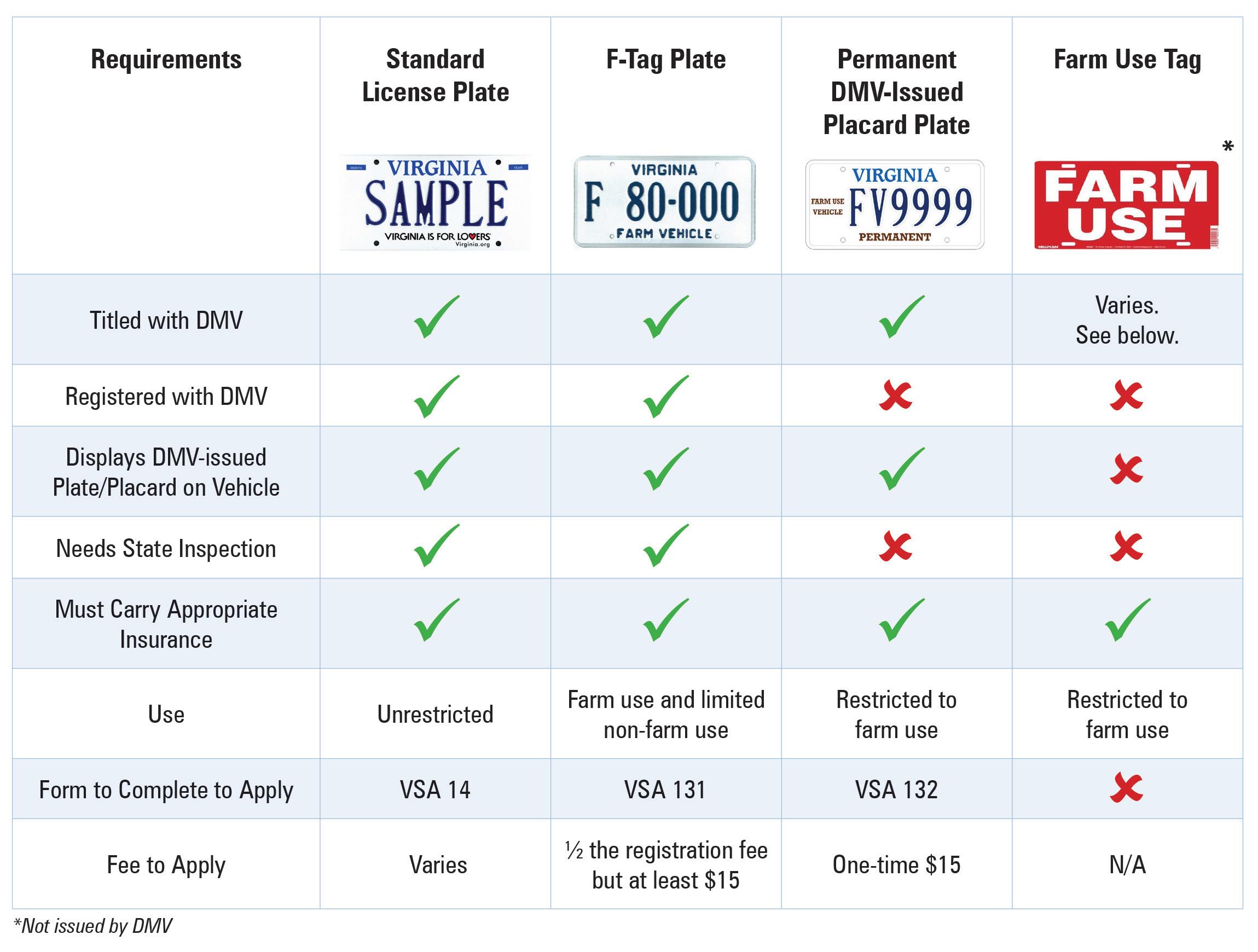
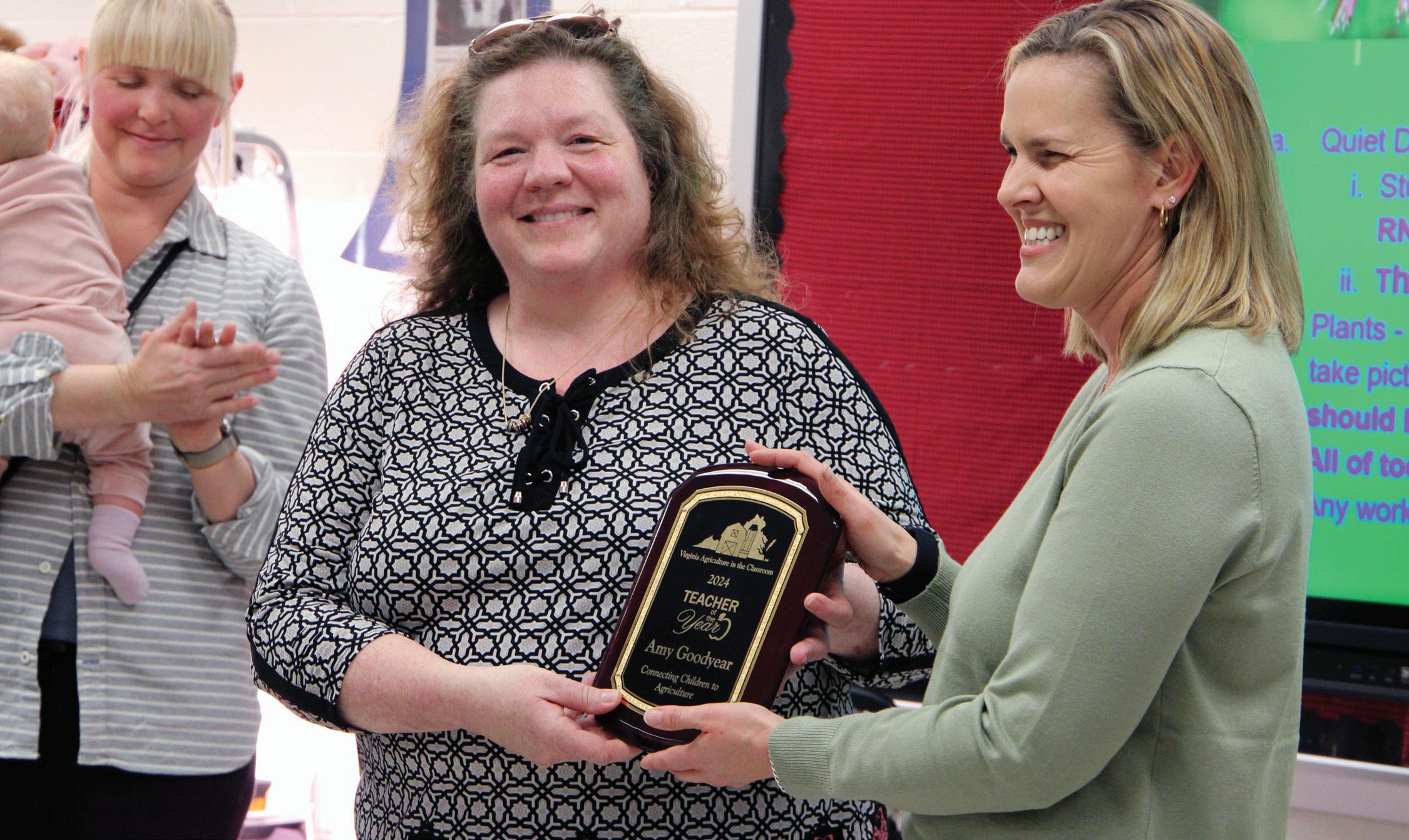 BY ALICE KEMP
BY ALICE KEMP
Amy Goodyear, a biology teacher at Heritage High School in Leesburg, has been named the Virginia Agriculture in the Classroom 2024 Teacher of the Year.
The award recognizes a Virginia educator for incorporating agriculture into his or her core curriculum.
In addition to being named Virginia AITC Teacher of the Year, Goodyear is one of eight recipients of the 2024 National Excellence in Teaching About Agriculture Award from the National Agriculture in the Classroom Organization. Each year the organization honors eight pre-K through 12th grade teachers across the U.S. for innovative ways they are using agricultural concepts to teach reading, writing, math, science, social studies, STEM, STEAM and more.
Goodyear uses hands-on activities and real-life applications in her classroom to familiarize students with agricultural concepts. She encourages her students to develop a deeper understanding of agricultural sciences through activities like NASA’s Plant the Moon Challenge, a project that explores growing food on the lunar surface while emphasizing the importance of soils and nutrients for plant growth. The international challenge allows students to hone their critical thinking and problem-solving skills as they dive into scientific concepts, mathematical equations and environmental studies.
“It was just fantastic to see all the different and engaging ways she is using agriculture to apply to many different modern problems, both here on Earth and on the moon,”
said Lynn Black, Virginia AITC education program coordinator, during a Feb. 22 ceremony at Heritage High School.
Additionally, Goodyear employs agriculture as the medium to explore other required standards. Her students participate in a chicken embryology lab to study life cycles, experiment with strawberry DNA and use wheat products and breadmaking to study cellular respiration.
“Amy sees science and agriculture as living and breathing all around students, and she wants to facilitate opportunities for students to experience its wonder and impact on their daily lives,” said Tammy Maxey, Virginia AITC executive director. “As a result, students have a greater appreciation for agriculture and its potential career opportunities. Students who might not have considered it before can find themselves drawn to the world of agriculture.”
As Virginia AITC Teacher of the Year, Goodyear will receive a $500 cash award, and a $500 honorarium for the national award. She also will receive a scholarship to the 2024 National AITC Conference this June in Salt Lake City, where she and the other winning teachers will be recognized.
For more information on the Teacher of the Year recognition, visit virginia.agclassroom.org
The Virginia Foundation for Agriculture in the Classroom is a 501c3 nonprofit organization that promotes a greater understanding and appreciation of agriculture through education and outreach activities. To learn more and support, visit virginia.agclassroom.org
Like an invasive plant that spreads uncontrollably, stress left unattended can compromise every aspect of a farmer’s life.
Exposure to high stress over long periods of time negatively impacts physical and mental health, which can lead to the development of stressrelated diseases and disorders. It also can impair one’s ability to sleep, relax, concentrate or make decisions— threatening farm health and safety.
A recent Mercer University survey found that farming, with so many factors beyond one’s control, comes with an extraordinary amount of stress—with 96% of surveyed Georgia farmers reporting feeling either moderately or highly stressed.
With these 12 farmers’ wellness tools adapted from North Dakota State University Extension, farmers suffering from chronic stress symptoms can reclaim control.
NDSU Extension recommends choosing at least three practical wellness strategies to begin each day. Post them in your home, office or vehicle as a reminder of your commitment to improving your wellness.

• Exercise 20 minutes or more daily. Physical activity like walking, swimming, riding a bike or yoga enhances feeling good.
• Get a medical checkup with a local health care provider. Stress can cause or add to physical challenges.
• Spend 10 minutes planning your day and priorities. A few minutes of planning reduces stress and helps you stay focused.
• Take regular five- to 10-minute breaks in your day to relax and recharge. Doing this multiple times a day renews your energy.
• Write down three things that you are grateful for daily. Conscious gratitude is calming.
• Share concerns with a counselor or other professional. A listening ear helps lift your burdens. The AgriStress Helpline is available 24 hours a day, 7 days a week. Call or text 833-897-2474 to speak with a health care professional versed in agriculture.
• Take at least 15 minutes each day for uninterrupted conservation with a spouse or family member. Having the love and support of people around you can help mediate negative health effects of burnout.
• Get involved or stay connected with a friend or group of friends. Research indicates that people with high levels of social support are more resilient in the face of stressful situations.
• Discuss needs of the farm operation, but do not let them occupy all other aspects of life. Plan other daily work tasks to shift your focus.
• Seek constructive feedback on your farm operation and ways to grow or improve. Others can share ideas or assist in new ways.
• Create a family budget, and seek to live within your means. This helps give you a sense of financial control.
• Select three healthy habits you will try to practice daily. Start today.
Visit AgriSafe.org for additional mental health resources.

When a farmer is killed, there are implications for the family, the community and sometimes the agricultural landscape of a region.
“People involved in farming only account for 2% of the population, and we have to feed the other 98% in this country and others,” said Curt Porterfield, training coordinator for Virginia Tech Environmental Health and Safety. He led an all-terrain vehicle safety webinar last year, asking the stark question—What happens when a farmer dies?
“What happens to that farm?” Porterfield continued. “Can someone take it over? Or can it be sold? A lot of those areas are becoming housing developments. People don’t think about the implications if something goes wrong.”
ATVs are essential for many farm chores, from building fences to checking on livestock, noted Matt Nuckols, chair of Virginia Farm Bureau Federation’s Farm Safety Advisory Committee.
“But they also pose serious hazards to operators,” he said. “These vehicles, based on the size, can be a lot more powerful than people anticipate. Their weight and speed make it easy for an individual to lose control.”
Porterfield said the Occupational Safety and Health Administration reported that from 2003 to 2013, there were 2,090 injuries and 321 deaths because of occupational use of ATVs— with 60% of ATV-related fatalities occurring in agriculture.
Prevent overturns
“I personally know several people who have died in ATV overturns, and
asphyxiation from the weight of the machine on that person’s chest is ultimately what took their life,” he explained.
The risk for ATV overturns increases when the center of gravity shifts.
“Think about what adding a sprayer does,” Porterfield said. “It moves the center of gravity toward the rear. Just 10 gallons is an extra 80 pounds of weight in the back.”
Depending on the machine, ATV manufacturers may offer optional rollover protection systems. But Porterfield hears plenty of excuses for not using ROPS.
“ROPS will hinder the load,” he’s heard farmers say. “But there’s no excuse that’s going to bring someone back from a serious workplace injury or fatality.”
His team mined data from regional health systems and found that ATV-related injuries and fatalities in the mountainous counties of Southwest Virginia are up 30% since 2021. The team is working to reverse that troubling trend through safety outreach.
Employers with more than 10 employees in higher-hazard industries like agriculture and forestry must keep accurate records of work-related injuries, according to the Occupational Safety and Health Administration.
“If you’re a larger employer or farmer, OSHA requires you to train all of your employees on hazards,” Porterfield said.
An “active rider” is a safe operator. Active riders have the physical ability
to make quick body weight shifts combined with acceleration and braking.
The ATV operator should always review the owner’s manual, understand weight and load limitations, inspect the vehicle before engaging, and become familiar with the terrain.
Some topography changes with the seasons. Holes and ruts; trees, stumps and big rocks; fencing and wires; creeks, culverts and streams can be obscured at certain times of year.
“In the summertime when grass is 3 feet tall can make it harder to see those,” Porterfield noted. “But you can put a flag in an area that has a culvert or a stump.”
When working alone, always have a check-in procedure, he added.
“Tell someone where you’re going to be and a reasonable return time.”
A cheap bike helmet won’t cut it for ATV operators, he said. A motorcycle or motorsports helmet is recommended by the U.S. Consumer Product Safety Commission.
Eye protection, boots, gloves, long pants and a long-sleeved shirt or jacket offer protection when encountering flying debris or foliage.
For safe operation, use the pre-ride checklist provided by the ATV manufacturer if possible. Scan the QR code, or visit ehs.vt.edu/FarmSafety to view and print the Virginia Tech Environmental Health and Safety’s ATV preride checklist and see other safety resources.


Navigating the ins and outs of Medicare can be complicated and confusing. To help shed light on the process, Virginia Farm Bureau is hosting another round of its free virtual Medicare seminars for members throughout the spring and summer.
The informational seminars will help members gain an understanding of how Medicare works, eligibility, enrollment periods, and plan options and timelines—all from the comfort of their homes. The virtual sessions typically last an hour and are open to anyone, regardless of age. A health insurance representative from VAFB Health Insurance Solutions will present the material and answer questions.
Register for free virtual Medicare seminars by contacting your local Farm Bureau office, or register online at vafb.com/health/medicare-seminars
April 11, 10 a.m.
May 14, 6 p.m.
June 6, 2 p.m.
July 18, 10 a.m.
August 20, 6 p.m.
September 21, 11 a.m.

 BY NICOLE ZEMA
BY NICOLE ZEMA
Driving Awareness Month reminds motorists to keep their eyes, hands and minds focused on the road
Boyd and Helen Smith of Hanover County were traveling to Virginia Farm Bureau Federation’s annual convention in Virginia Beach last fall when they were rear-ended on Interstate 264 by a vehicle towing a trailer.
“I took my eyes off the road, looking in the rearview mirror to check the trailer,” the Smiths recalled the other driver saying. He’d never towed a trailer before, and when traffic stopped ahead, inertia slowed his braking time.
Smith saw it coming and was able to pull partly into the emergency lane before the crash, but the distracted motorist hit them hard. They were grateful for no injuries, but their vehicle sustained $4,800 worth of damage.
Each day, over 1,000 people are injured and nine are killed in crashes involving distracted driving, according to data reported by Drive Smart Virginia. Virginia Farm Bureau has long partnered with the nonprofit organization charged with raising awareness and changing behavior to improve roadway safety.
April is Distracted Driving Awareness Month, and the observance reminds drivers to eliminate distractions. The Centers for Disease Control and Prevention describe three types of distracted driving—visual, manual and cognitive.
“Visual distractions take your eyes off the road,” said David Tenembaum, DSV treasurer and VFB senior actuarial manager. “Manual distractions include taking your hands off the wheel. Cognitive distractions occur when your mind wanders from the driving task at hand.”
In 2020, it became illegal in Virginia to hold a handheld mobile device while driving. DSV recommends enabling a “Do Not Disturb” app to block incoming correspondence while the vehicle is in motion. Or use your device’s handsfree options carefully.
“Hands-free isn’t risk-free,” Tenembaum continued. “Even if the phone isn’t in your hand, there are still dangers involved when a driver doesn’t fully concentrate on the road.”
With Virginia Farm Bureau’s usage-based insurance program Drive2Save, motorists are rewarded with lower premiums for safe driving habits. VFB auto insurance customers who enroll in Drive2Save receive a participation discount of approximately 10%. With good driving scores, they may qualify for savings at policy renewal of up to 30%.
The Drive2Save program’s smartphone app runs in the background to gather driving information, allowing participants to track their driving scores and specific incidents that may impact their scores—like speed, cornering, hard braking and distracted driving.
“This gives participants a picture of what they’re doing well and where they can improve to become safer drivers,” said Ben Ashby, VFB underwriting personal lines manager. “And the more favorable the driving score, the lower the insurance premium.”
Drivers with a VFB Fire & Casualty personal automobile policy are eligible to enroll. Drive2Save enrollment is available at the start of a new policy, or upon renewal for existing policyholders.
To learn more about the Drive2Save program, contact your local Farm Bureau insurance agent.
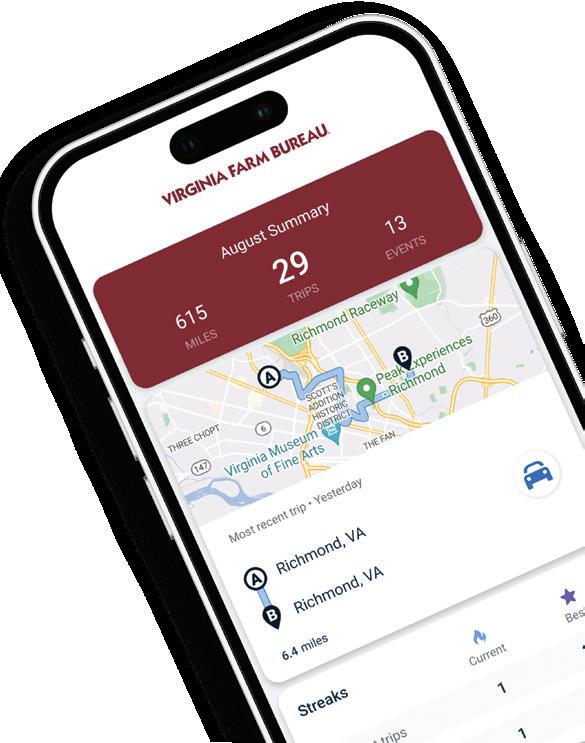
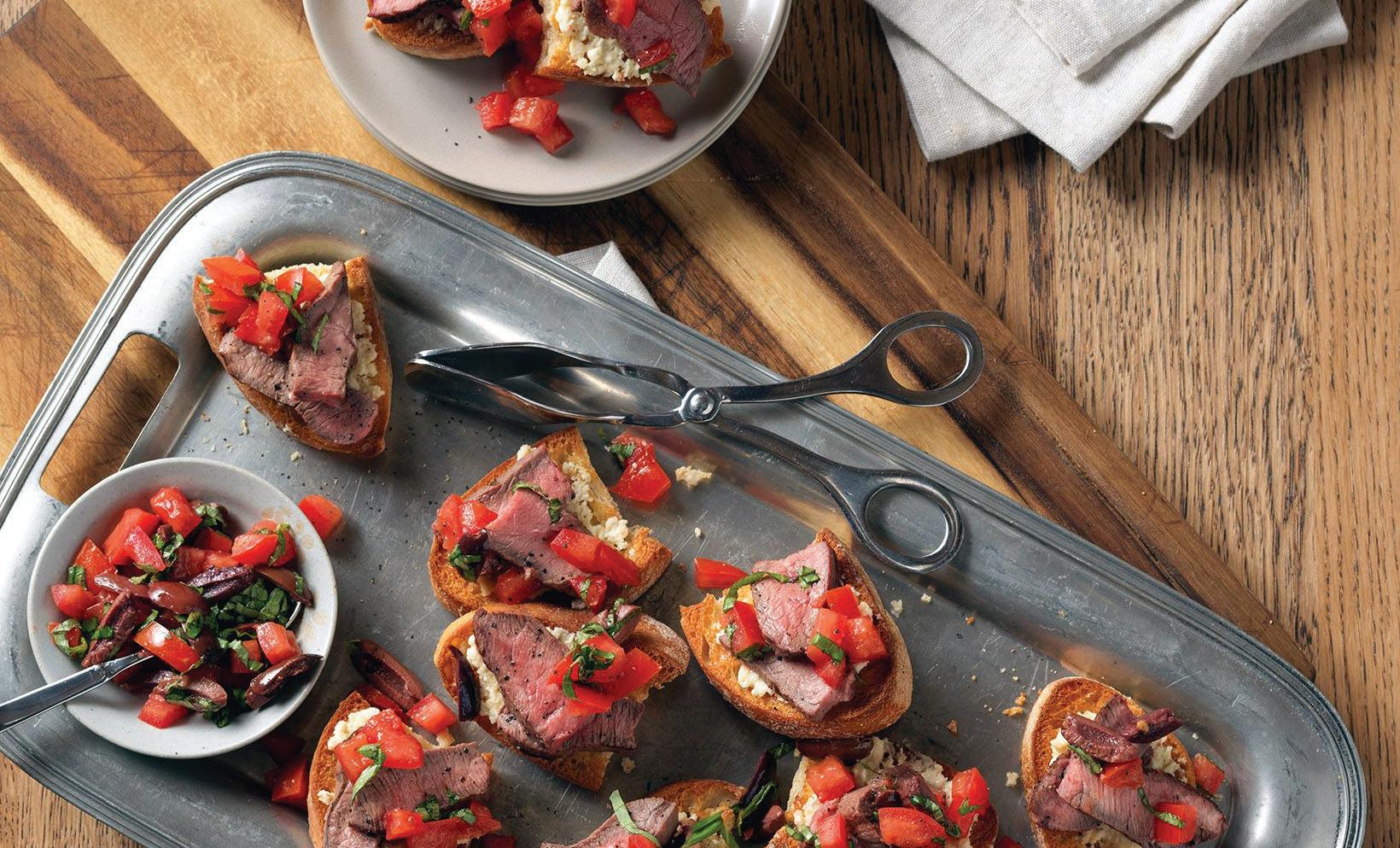

With humble beginnings traced back to farmers and laborers in ancient Rome, bruschetta began its journey into the culinary world as a hearty snack and a way to use days-old bread. Originally consisting of just three ingredients—bread grilled over an open fire and brushed with garlic and olive oil—the rustic dish evolved into a favorite Italian antipasto with unlimited variations incorporating countless ingredients.
Bruschetta’s signature crusty bread makes it a tasty blank canvas for toppings.
Keep it classic with fresh Virginia-grown tomatoes and basil, or get creative with local produce like arugula, mushrooms or sweet potatoes. Enhance the medley with locally sourced meats and cheeses, add a punch of flavor with a fruity jam or savory spread, and top it all off with olive oil or a balsamic glaze drizzle.
Not just for appetizers, bruschetta also can dip into the divine with desserts featuring berries and chocolate.
½ loaf French bread, cut into slices
1 tablespoon olive oil, divided
2 tomatoes, diced
¼ cup basil, chopped
½ tablespoon minced garlic
½ tablespoon balsamic vinegar pinch of salt pinch of pepper
2 ounces grated Parmesan cheese
Heat oven to broil.
Brush the bread slices with ½ tablespoon olive oil, and place on a baking sheet. Toast the bread until crispy, about 2-3 minutes.
Mix the remaining ingredients together in a bowl. Spoon the mixture onto the toasted bread and enjoy!
—Recipe adapted from North Carolina Cooperative Extension
INGREDIENTS
5 cloves garlic, smashed
2 tablespoons vegetable oil
2 tablespoons olive oil
1 loaf ciabatta bread (11-14 ounces)
¾ cup feta cheese crumbles
8-ounce flat iron steak
½ teaspoon kosher salt
¼ teaspoon coarse ground black pepper
1 cup diced Roma tomatoes, seeded, ribs removed
⅓ cup packed Kalamata olives, cut in half lengthwise, then into ¼" half moons
⅓ cup thinly sliced fresh basil leaves
DIRECTIONS
Heat oven to 375°. Simultaneously, light a charcoal grill or turn on a gas grill until it’s at medium heat.
In a small saucepan over medium-low heat, warm the garlic, vegetable oil and olive oil. Cook 8-10 minutes or until the garlic begins to brown. Remove from heat; set aside to cool.
Drain the garlic from the oil and set aside. Reserve 2 tablespoons of the oil for the bread and 2 tablespoons for the tomato mixture; set aside.
Cut the ciabatta in half lengthwise. Slice into 18 half-inch pieces, and place on a shallow-rimmed baking sheet. Brush each piece with the reserved 2 tablespoons of garlic oil. Bake in the oven for 10 minutes, and set aside.
Chop the cooled garlic, and return to the same saucepan. Add the feta, and over medium heat, cook 4-5 minutes until the cheese is melted and looks like ricotta cheese. Keep warm.
Season the steak with salt and pepper. Place the steak on a grid over ash-covered coals. Cover, and grill 10-14 minutes. Or, place the steak on a preheated gas grill, covered, for 12-16 minutes, for medium rare (145°) to medium (160°) doneness, turning occasionally.
In a small bowl, combine the tomatoes, olives, basil and the remaining 2 tablespoons oil, and set aside.
Spread 2 teaspoons of the garlic-feta mixture on each piece of toasted ciabatta. Carve the steak into ¼" slices, and then cut each slice into 1½" pieces. Place two steak pieces on each piece of ciabatta, and top with one tablespoon of the tomato mixture.
—Recipe adapted from Beef. It’s What’s For Dinner.
½ baguette or loaf of French bread
4 tablespoons Nutella or other chocolatehazelnut spread
1 cup strawberries
1 tablespoon fresh mint
Heat oven to 400°.
Slice the bread into four equal ½” pieces, and toast in the oven until slightly golden on top.
Spread the Nutella on top of the toasted bread slices.
Chop the strawberries, then place the berries on top of the Nutella toast.
Top with fresh mint, and enjoy.
—Recipe adapted from the California Strawberry Commission


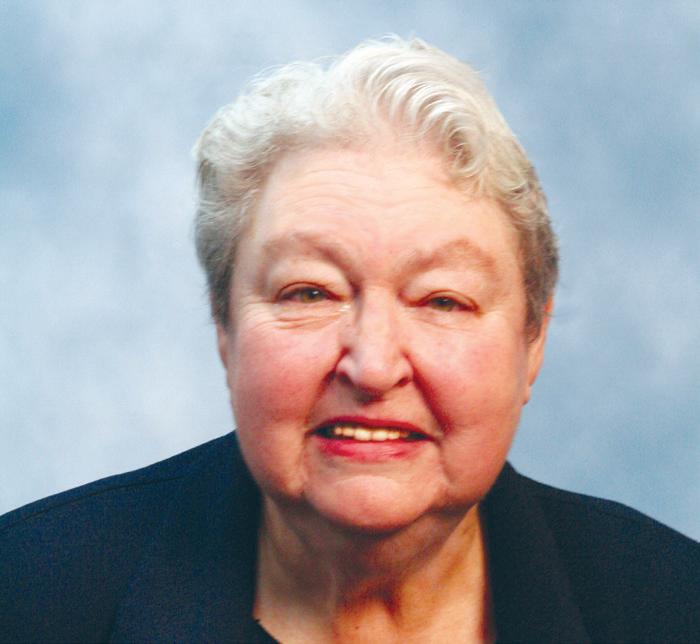
Evelyn H. Janney, a former member of the Virginia Farm Bureau Federation board of directors, died Dec. 17, 2023.
Mrs. Janney, who was 85, served on the VFBF board from 2005 to 2016, representing District 3. She was a past president of Floyd County Farm Bureau, chaired her county Farm Bureau’s women’s committee and previously served as its legislative director.
A Farm Bureau member since 1976, Mrs. Janney raised cattle on her family farm in Floyd and was well known for her involvement in Farm Bureau policy and its legislative efforts.
She chaired the VFBF Natural and Environmental Resources
and Forestry Advisory Committee and served on several other VFBF advisory committees. Believing in the importance of grassroots advocacy and connecting with legislators, she served on the team that established the VFBF AgPAC political action committee and was an AgPAC trustee.
She also served on the Virginia Foundation for Agriculture in the Classroom board, and in 1991 she was named VFBF Farm Woman of the Year. She was recognized for her active leadership and commitment to Farm Bureau with the Distinguished Service Award in 2016.
“She really had a heart for agriculture, for her region she represented, and for her family,” said VFBF board member Emily Edmondson, who served alongside Janney. “She was devoted
to Farm Bureau and very astute. She looked like the sweet grandmotherly type, but she understood politics, and she was a player.”
That devotion continued in her community, where she served on several county planning commissions and advisory committees. She was an organist, pianist, youth teacher and active volunteer at Stonewall Brethren/ Methodist Church, and was a member of the Floyd Courthouse Chapter of the Daughters of the American Revolution and the American Legion Auxiliary. She also volunteered at the Salem VA Medical Center and was involved in local 4-H activities.
Mrs. Janney is survived by her two sons, a daughter, two brothers, a sister, 10 grandchildren and several nieces and nephews.

